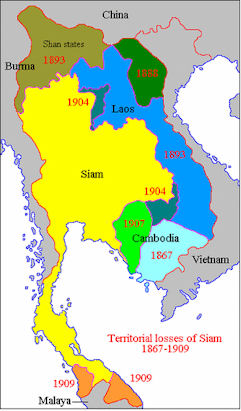

Zitierweise / cite as:
Payer, Alois <1944 - >: Chronik Thailands = กาลานุกรมสยามประเทศไทย. -- Chronik 2009 / B. E. 2552. -- 2. Januar bis Juni. -- Fassung vom 2017-03-22. -- URL: http://www.payer.de/thailandchronik/chronik2009b.htm
Erstmals publiziert: 2013-04-15
Überarbeitungen: 2017-03-22 [Ergänzungen] ; 2017-01-02 [Ergänzungen] ; 2016-04-18 [Ergänzungen] ; 2016-01-18 [Ergänzungen] ; 2015-12-30 [Ergänzungen] ; 2015-06-02 [Ergänzungen] ; 2015-05-27 [Ergänzungen] ; 2015-02-16 [Ergänzungen] ; 2015-01-21 [Ergänzungen] ; 2014-11-23 [Ergänzungen] ; 2014-10-24 [Ergänzungen] ; 2014-10-16 [Ergänzungen] ; 2014-02-15 [Ergänzungen] ; 2013-10-17 [Ergänzungen] ; 2013-04-25 [Teilung des Jahrgangs] ; 2013-04-21 [Ergänzungen]
©opyright: Dieser Text steht der Allgemeinheit zur Verfügung. Eine Verwertung in Publikationen, die über übliche Zitate hinausgeht, bedarf der ausdrücklichen Genehmigung des Herausgebers.
Dieser Text ist Teil der Abteilung
Thailand von
Tüpfli's Global Village Library
ช้างตายทั้งตัวเอาใบบัวปิดไม่มิด
|
Gewidmet meiner lieben Frau Margarete Payer die seit unserem ersten Besuch in Thailand 1974 mit mir die Liebe zu den und die Sorge um die Bewohner Thailands teilt. |
|
Bei thailändischen Statistiken muss man mit allen Fehlerquellen rechnen, die in folgendem Werk beschrieben sind:
Die Statistikdiagramme geben also meistens eher qualitative als korrekte quantitative Beziehungen wieder.
|
2009-01 - 2009-03
Im ersten Quartal starke wirtschaftliche Rezession.
Abb.: Wachstum des Bruttosozialprodukts in %, 2008 - 2009
[Datenquelle: NESDB]
2009-01

Thailändische Sicherheitskräfte haben offensichtlich über 1000 Rohingya (ရိုဟင်ဂျာ) Migranten ins Meer hinausgetrieben und auf ihren Schiffen ohne Treibstoff, Wasser und Essen ihrem Schicksal überlassen. Die indische Küstenwache rettet 446 Boat People, die zu diesen Vertriebenen gehören. Ministerpräsident Abhisit verspricht eine Untersuchung.
Abb.: Einbandtitel
[Bildquelle: (Richard Sollom / Physicians for Human Rights. -- http://www.flickr.com/photos/physiciansforhumanrights/4417558764/. -- Zugriff am 2012-01-13. -- Creative Commons Lizenz (Namensnennung, keine kommerzielle Nutzung, share alike)]
Abb.: Lage des Rakhaing-Staates (ရခိုင်ပြည်နယ)
[Bildquelle: CIA. -- Public domain]
"Die Rohingya (ရိုဟင်ဂျာ) sind eine muslimische Volksgruppe in Myanmar (Birma). Sie leben dort hauptsächlich im nördlichen Teil des an Bangladesch grenzenden Rakhaing-Staates (ရခိုင်ပြည်နယ်, ehemals Arakan). Dort leben heute etwa eine Million Rohingya. Mindestens ebenso viele leben als Flüchtlinge in Bangladesch und weiteren Ländern Asiens, weil sie unter der Militärregierung Myanmars Repressionen ausgesetzt sind und nicht als Staatsbürger anerkannt werden." [Quelle: http://de.wikipedia.org/wiki/Rohingya. -- Zugriff am 2012-01-13]
"Over the years thousands of Rohingya also have fled to Thailand. There are roughly 111,000 refugees housed in 9 camps along the Thai-Myanmar border. There have been charges that groups of them have been shipped and towed out to open sea from Thailand, and left there. In February 2009 there was evidence of the Thai army towing a boatload of 190 Rohingya refugees out to sea. A group of refugees rescued by Indonesian authorities also in February 2009 told harrowing stories of being captured and beaten by the Thai military, and then abandoned at open sea. By the end of February there were reports that of a group of 5 boats were towed out to open sea, of which 4 boats sank in a storm, and 1 boat washed up on the shore. February 12, 2009 Thailand's prime minister Abhisit Vejjajiva said there were "some instances" in which Rohingya people were pushed out to sea. "There are attempts, I think, to let these people drift to other shores. [...] when these practices do occur, it is done on the understanding that there is enough food and water supplied. [...] It's not clear whose work it is [...] but if I have the evidence who exactly did this I will bring them to account."
The prime minister said he regretted "any losses", and was working on rectifying the problem."
[Quelle: http://en.wikipedia.org/wiki/Rohingya. -- Zugriff am 2012-01-13]
2009-01 - 2012-06

Die Bundesrepublik Deutschland fördert das Projekt Sustainable Palm Oil Production for Bioenergy
2009-01-01
Bei einem Feuer in der Neujahrsnacht im Nachtclub "Santika" (Santika Club, ซานติก้าผับ) in Bangkok kommen 66 Personen um und 240 werden verletzt. Der Nachtklub wurde nicht mehr auf Einhaltung der Sicherheitsvorschriften überprüft, seitdem ein hoher Polizist Teilhaber geworden war.
Abb.: Santika-Nachtklub, Bangkok, 2007
[Bildquelle: arkadin55. -- http://www.flickr.com/photos/16734870@N07/3154991974/. -- Zugriff am 2012-01-13. -- Creative Commons Lizenz (Namensnennung, keine kommerzielle Nutzung, share alike)]
2009-01-03
Tod von M. L. Manich Jumsai (ม.ล. มานิจ ชุมสาย, 1908 - 2009)
Abb.: M. L. Manich Jumsai (ม.ล. มานิจ ชุมสาย)
[Bildquelle: th.Wikipedia. -- Fair use]
"M. L. Manich Jumsai (auch Manit Choomsai, Thai: ม.ล. มานิจ ชุมสาย; * 5. Oktober 1908 in Chachoengsao (ฉะเชิงเทรา); † 3. Januar 2009 in Bangkok) war ein thailändischer Gelehrter und Pädagoge. Die Familie von Manich besaß nur unbedeutende finanzielle Mittel. Der Sohn konnte jedoch 1925 ein Stipendium des Königs gewinnen und ging anschließend nach England, um am Trinity College in Cambridge Sprachen und Pädagogik zu studieren. Nach seinem Abschluss kehrte er nach Thailand zurück und widmete sich akademischen Aufgaben des Bildungsministeriums. 1940 gründete er das thailändische Lehrerkolleg, wobei er Wert auf die Ausbildung von Lehrern auf dem Land und von Frauen legte. Dieses Lehrerkolleg diente später als Grundlage für das Rajabhat-System (ราชภัฏ). Auch der erste experimentelle Kindergarten des Landes, La-or Uthis, war ein Werk von Manich. Daneben schrieb er Lehrbücher für die englische Sprache und entwarf spezielle Lehrprogramme für die Vorschule.
1949 half Manich bei der Gründung der späteren Srinakarinwirot-Universität (มหาวิทยาลัยศรีนครินทรวิโรฒ) in Bangkok, indem er ein Stück Land der Soi Prasanmit erwarb und es Pin Malakul (หม่อมหลวงปิ่น มาลากุล, 1903 -1995), dem eigentlichen Gründer zur Verfügung stellte. Das Königliche Institut von Thailand (ราชบัณฑิตยสภา) war schon fast in Vergessenheit geraten, als Manich dessen akademischen Aktivitäten wiederbeleben konnte. Seit 1950 arbeitete Manich im Hauptquartier der UNESCO in Paris und war verantwortlich für Ausbildungsprogramme in Entwicklungsländern. Wichtigstes Ergebnis dieser Tätigkeit war die erstmalige Schaffung einer Schrifttype für die laotische Schrift, die für eine Druckerpresse in Vientiane (ວຽງຈັນ) gedacht war.
Bekannt sind im Ausland vor allem die von Manich initiierten und bearbeiteten Wörterbücher für Thai-Deutsch-Thai, Thai-Englisch-Thai und Thai-Französisch-Thai. Während seiner Zeit in Paris nahm sich Manich jedoch auch Zeit, die Beziehungen zwischen Siam/Thailand und dem Westen nachzugehen und diese zu popularisieren. Hierfür sammelte er alte Bücher, Karten und Manuskripte über Siam in europäischen Sprachen.
1972 initiierte Manich die erste Bücherschau des Landes, zunächst in Zelten entlang der Straße. Heute ist die jährliche Büchermesse in Bangkok eine der größten kulturellen Veranstaltungen in Thailand.
Manich Jumsai starb am 3. Januar 2009 in Bangkok im Alter von 100 Jahren an Herzversagen."
[Quelle: http://de.wikipedia.org/wiki/Manich_Jumsai. -- Zugriff am 2015-02-16]
2009-01-04
Bangkok Post: Somkiat Onwimon (ดร.สมเกียรติ อ่อนวิมล, 1948 - ) über Banharn Silpa-archa (บรรหาร ศิลปอาชา, 1932 - ):
Abb.: Somkiat Onwimon (ดร.สมเกียรติ อ่อนวิมล)
[Bildquelle:
"[Suphanburians] [สุพรรณบุรี] have long been misled into thinking Mr. Banharn [Banharn Silpa-archa - บรรหาร ศิลปอาชา, 1932 - ] is solely responsible for public projects in the province, even to the point where they believe he paid for the projects out of his own pocket. Little [do] they know the money spent on dozens of public utilities and ... infrastructure, ranging from roads to public schools ... which invariably bear the name of Banharn-Jaemsai [บรรหาร-แจ่มใส], actually come from the pockets of taxpayers nationwide."
Abb.: Lage der Provinz Suphan Buri (สุพรรณบุรี)
Bildquelle: [Bildquelle: CIA. -- Public domain]
2009-01-06

Sheikh Hasina Wajed (হাসিনা ওয়াজেদ, 1947 - ) wird Ministerpräsidentin von Bangladesh.
Abb.: Bangladesh
[Bildquelle: CIA. -- Public domain]
Abb.: Sheikh Hasina Wajed (হাসিনা ওয়াজেদ)
[Bildquelle: DonkeyHotey. -- http://www.flickr.com/photos/donkeyhotey/5680228436/in/photostream. -- Zugriff am 2012-02-20. -- Creative Commons Lizenz (Namensnennung, share alike)]
2009-01-11

Wahl des Gouverneurs von Bangkok (ผู้ว่าราชการกรุงเทพมหานคร). Mit 45% der abgegebenen Stimmen wird gewählt: Sukhumbhand Paripatra (สุขุมพันธุ์ บริพัตร, 1952 - ), Kandidat der Democrat Party (พรรคประชาธิปัตย์).
Abb.: Wahlplakat von Sukhumbhand Paripatra (สุขุมพันธุ์ บริพัตร)
[Bildquelle: Sodacan / Wikipedia. -- Public domain]
"Sukhumbhand Paripatra (Thai: สุขุมพันธุ์ บริพัตร, vollständiger Name Mom Rajawongse Sukhumbhand Paribatra, RTGS-Umschrift: Mom Ratchawong Sukhumphan Boriphat - หม่อมราชวงศ์สุขุมพันธุ์ บริพัตร; * 22. September 1952 in Bangkok) ist ein thailändischer Politiker und Mitglied der Demokratischen Partei. Sukhumbhand wurde als Sohn des Prinzen Sukhumbhinanda (พระวรวงศ์เธอ พระองค์เจ้าสุขุมาภินันท์, 1923 - 12003)und dessen nicht-adeliger Ehefrau Mom Dusadee Na Thalang (หม่อมดุษฎี ณ ถลาง) geboren. Prinz Sukhumbhinanda selber war ein Sohn von Prinz Paripatra Sukhumbhand von Nakhon Sawan, dem einzigen Kind von König Chulalongkorn (Rama V.) mit seiner Königlichen Gemahlin Sukumalmarsri (สุขุมาลมารศรี, 1861 -1927) . Sukhumbhand ist daher ein Cousin des derzeitigen Königs Bhumibol Adulyadej (Rama IX.) und somit ein möglicher – allerdings höchst unwahrscheinlicher – Thronerbe.
Von 1963 bis 1970 erhielt Sukhumbhand seine Grundschulausbildung in der Cheam School (Hampshire) und in der Rugby School (Warwickshire) in England. Am Pembroke College erhielt er 1977 einen Bachelor in Politikwissenschaft.
Sukhumbhand war von November 1997 bis Februar 2001 der stellvertretende Außenminister von Thailand.
Bei der Wahl am 11. Januar 2009 wurde er mit einer Mehrheit von 45 % zum 15. Gouverneur von Bangkok gewählt."
[Quelle: http://de.wikipedia.org/wiki/Sukhumbhand_Paribatra. -- Zugriff am 2012-10-07]
2009-01-19
Die oppositionelle UDD [แนวร่วมประชาธิปไตยต่อต้านเผด็จการแห่งชาติ / Rothemden] beginnt ein das Satellitenfernsehen DTV (Democracy TV / ประธานสถานีประชาธิปไตย). Direktor ist Adisorn Piangket (อดิศร เพียงเกษ, 1952). DTV ist Nachfolger des PTV (Peoples TV / ประธานสถานีประชาชน)
2009-01-19
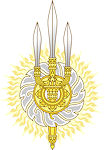

Der Australier Harry Nicolaides (1967/68 - ) wird wegen Majestätsbeleidigung (lèse-majesté) verurteilt. Die Beleidigung soll in seinem im Selbstverlag 2005 veröffentlichten Buch Verisimilitude vorkommen. Vom Buch waren 7 Exemplare verkauft worden. Am 21. Februar wird er vom König amnestiert.
"Harry Nicolaides (born 1967 or 1968) is an Australian writer of Greek-Cypriot origin imprisoned in Thailand under the Thai lèse majesté law, for a passage in a 2005 novel of his deemed to defame the Thai monarchy. On 19 January 2009 he was sentenced to three years in prison. He was pardoned on 21 February, after having spent six months in a Thai prison. Personal background
In 2002 Nicolaides had published Concierge Confidential, a collection of fictional short stories based on his experience of having worked for seven years as chief concierge at Melbourne's Rydges Hotel. He lived in Thailand from 2003 to 2005, working as a teacher in the northern Thai city Chiang Rai (เชียงราย). Nicolaides later also lived and worked in Saudi Arabia, and wrote an article about the country as he perceived it, for The New Statesman.
The lèse majesté lawThe Thai law, section 112, reads: "Whoever defames, insults or threatens the King, the Queen, the Heir-apparent or the Regent, shall be punished with imprisonment of three to fifteen years."
Imprisonment, trial, sentenceNicolaides was arrested at the Bangkok airport on 31 August 2008 while preparing to board a plane to Australia, apparently unaware of a March arrest warrant.
Wearing shackles and handcuffs on 19 January 2009, the day of the trial, Nicolaides told reporters that he would like to apologise and that he had "unqualified respect for the king of Thailand" and had not intended to insult him. He added "I was aware there were obscure laws (about the monarchy) but I didn't think they would apply to me."
He pleaded guilty and due to this confession a six year prison sentence was reduced to three years, the minimum sentence under the law.
He later described the harsh conditions in the Bangkok Remand Prison, relating that he had met the suspected Russian arms dealer Viktor Bout (Виктор Анатольевич Бут) and the Canadian child molester Christopher Neil there.
Offending textThe passage in question was from Nicolaides' 2005 self-published novel, Verisimilitude. Is the truth, the truth? which sold seven copies.The book was described in a news release as "an uncompromising assault on the patrician values of the monarchy", and as "savage, ruthless and unforgiving" in revealing a society "obsessed with Western affluence and materialism." The paragraph which resulted in his imprisonment discusses the personal life of a fictional prince:
- From ����� to the �����, the ����� was renowned for their romantic entanglements and intrigues. The ����� had many wives major and minor with a coterie of concubines for entertainment. One of his recent wives was exiled with her entire family, including a son they conceived together, for an undisclosed indiscretion. He subsequently remarried with another woman and fathered another child. It was rumoured that if ����� fell in love with one of his minor wives and she betrayed him, she and her family would disappear with their name, familial lineage and all vestiges of their existence expunged forever.
Many Western media outlets, including CNN, refused to publish the substance of the allegation for fear of reprisals against their staff.
Nicolaides says that he sent letters to the Royal Bureau of Household Affairs, the Ministry of Justice, the Ministry of Culture to get a legal opinion on the passage, but did not receive a reply.
PardonNicolaides' lawyers were pressing for a royal pardon, an effort supported by the Australian government. An official at the Thai Embassy in Canberra commented in January 2009 that foreigners convicted under this law usually get pardoned and deported.
Nicolaides received a royal pardon and returned to Melbourne on 21 February 2009.
On his initial release he had been taken to the Australian embassy in Bangkok and given clean clothes prior to the flight home. Minutes before boarding the flight he learned his mother had suffered a stroke two weeks prior and had lost the ability to speak. "I'm angry and frustrated and perplexed at my treatment," Nicolaides said. "I'm tired and exhausted and I've got a mother to go and see who's lost the power of speech." Nicolaides plans to write a book about the ordeal.
MotiveShortly after Nicolaides' release a former colleague at Mae Fah Luang University (มหาวิทยาลัยแม่ฟ้าหลวง), Heath Dollar, accused the author of intentionally including the passage knowing it would violate Thai law. This was done, according to Dollar, as a publicity stunt to attract attention and ensure Nicolaides' books would be published."
[Quelle: http://en.wikipedia.org/wiki/Harry_Nicolaides. -- Zugriff am 2012-01-13]
2009-01-20

Barack Hussein Obama II (1961 - ) wird Präsident der USA. Joseph Robinette "Joe" Biden, Jr. (1942 - ) wird Vizepräsident der USA.
Abb.: Barack Hussein Obama II und Joseph Robinette "Joe" Biden
[Bildquelle: DonkeyHotey. -- http://www.flickr.com/photos/47422005@N04/7407938042. -- Zugriff am 2014-02-15. -- Creative Commons Lizenz (Namensnennung, share alike)]
2009-01-21 - 2013-02-01

Hillary Diane Rodham Clinton (1947 - ) ist US Secretary of State (Außenministerin).
Abb.: Secretary of State Hillary Diane Rodham Clinton
[Bildquelle: DonkeyHotey. -- http://www.flickr.com/photos/donkeyhotey/4393393349/. -- Zugriff am 2012-01-05. -- Creative Commons Lizenz (Namensnennung, share alike)]
2009-01-26 - 2009-03-12
Es laufen die 28 Folgen des Lakorn (ละคร - Soap Opera) Artit Ching Duang (อาทิตยชิงดวง).
Abb.: Plakat
[Bildquelle: http://www.showwallpaper.com/show.php?wid=025376. -- Zugriff am 2013-03-28. -- Fair use]
"Artit Ching Duang is a Thai lakorn produced and broadcast in Royal Thai Army Radio and Television Channel 5 (สถานีวิทยุโทรทัศน์กองทัพบกช่อง 5). This TV series airs on Mondays to Thursdays at 20:25. Starring by Sinjai Plengpanich (สินจัย เปล่งพานิช, 1965 - ). Synopsis
Nok Sinjai takes on the role of Phanrawee, a woman trying to maintain her station in life. She is married to the wealthy Rangsee Soriyathit played by Pisan Akarasene (Aom’s biological father in real life and in this lakorn).
Rangsee and Phanrawee have no biological children together, they do have one adopted son Passakorn (Nat Tephassadin). Rangsee does have one biological child with another woman, Rangrong played by Aom Piyada. Rangsee did not know of her existence until she was grown. Rangrong is a feisty young woman out for revenge on Phanrawee the woman who harmed her mother and to claim what’s hers, which is Rangsee’s inheritance.
If someone else want to give another review just write it under the other synopsis.
Just to add some more to the above, Rangrong ended up not really being the biological daughter of Rangsee. What happened in the parents' younger years, Phanrawee did not want anyone to take Rangsee away from her because she really loved him. Rangsee fell for this women that played a traditional Thai musical instrument at an occasion he attended. Rangsee ends up getting her pregnant. Rangsee and Phanrawee got married but this other woman was still in the picture making Phanrawee mad. Phanrawee takes this woman to an abortion center. Every viewer is supposed to think that this woman refused to get an abortion and the child ended up being Rangrong. That is wrong. The other woman really did have an abortion. She (which is really played by Fang to make it easier to understand later on) used her talent to play near the temples when one day another woman shows up in the picture with her young newborn. Fang snatches that child, which is really Rangrong. So, the lakorn goes on with Rangrong being the victim until DNA proves that she is really not a member of Rangsee's family. So, Rangrong turns into the n'rai in the lakorn, which made it a really out-of-the-ordinary lakorn. Rangrong makes a fake will forcing Rangsee to sign everything to her. After he signs, she then kills him. Phanrawee does all that she can to take care of Rangrong but they were just equally tough. The bad that Phanrawee had done in her past came back to her and now she is faced with Rangrong, who was taught by Fang to get revenge for her and to take over everything that really belongs to them. Rangrong had a hard time believing it too that she was not Fang's child but still went on with her evil life since she had nothing to lose anymore. Rangrong's real mother ended up crazy the day her newborn was snatched from her. So, Phanrawee came in the contact with this woman by accident and does all that she can to determine if Rangrong was hers. Phanrawee almost succeeds until Rangrong killed her own mother by dropping her in the water. Rangrong does all this horrible things making Phanrawee become the victim. In the end, Rangrong commits suicide to wash away the sins she created after she was caught. Phanrawee ends the lakorn by making a statement about doing good and good will come but if you do bad then bad will come.
CastInternational Broadcast
- Phiyada Akarasenee (พิยดา อัครเศรณี) as Rangrong (รังรอง)
- Nat Thephussadin Na Ayutthaya (ณัฏฐ์ เทพหัสดิน ณ อยุธยา) as Pasakorn (Neung) (ภาสกร)
- Sinjai Plengpanich (สินจัย เปล่งพานิช, 1965 - ) as Parnrawee Suriyathid (ปานระวี สุริยทิตย์)
- Namthip Jongrachatawiboon (น้ำทิพย์ จงรัชตวิบูลย์) as young Parnrawee (ปานระวี (ตอนสาว))
- Akumsiri Suwannasuk (อคัมย์สิริ สุวรรณศุข) as Fahroong (ฟ้ารุ่ง)
- Pisarn Akarasenee (พิศาล อัครเศรณี) as Rangsee Suriyathid (รังสี สุริยทิตย์)
- Phutanate Hongmanop (ภูธเนศ หงษ์มานพ) as young Rangsee รังสี สุริยทิตย์ (ตอนหนุ่ม)
- Sathaporn Nakwilai (aka อนุวัฒน์ นิวาตวงศ์) as Chot (โชติ)
- Pop Kamkasem (ป๊อป คำเกษม) as Piangsoon (เพียงสูรย์)
- Waraporn Nguithrakul (วราพรรณ หงุ่ยตระกูล) as Napa (นภา)
- Surattana Kongthrakul (สุรัตนา ข้องตระกูล) as Sangla (แสงหล้า) (Rangrong's mother)
- Pitchaya Srithep(aka พิชญา เชาวลิต) as young Sangla (แสงหล้า (ตอนสาว))
Artit Ching Duang is aired in Malaysia's TV3 last July 20, 2010 entitled "Striving For A Sun". From Mondays to Thursdays at 3:00 PM."
[Quelle: http://en.wikipedia.org/wiki/Artit_Ching_Duang. -- Zugriff am 2012-03-06]
2009-01-29
Premiere des Films Fireball (ท้าชน) von Thanakorn Pongsuwan (ธนกร พงษ์สุวรรณ)
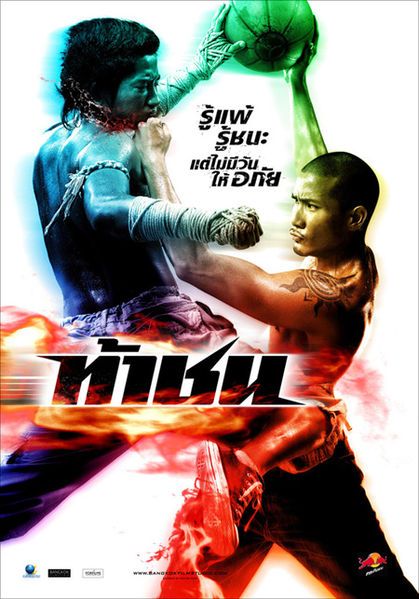
Abb.: Plakat
[Bildquelle: Wikipedia. -- Fair use]
|
Fireball (Thai: ท้าชน) ist ein thailändischer Spielfilm mit Martial-Arts-Elementen des Regisseurs Thanakorn Pongsuwan (ธนกร พงษ์สุวรรณ) aus dem Jahr 2009. HandlungThailand in der Gegenwart. Sträfling Tai (ไท) erlangt durch Geldzuwendungen seines Zwillingbruders Tan (แทน) Anspruch auf eine vorzeitige Haftentlassung, die ihm schließlich gewährt wird. Nachfolgend besucht der ehemalige Strafgefangene seinen selbstlosen Retter. Diesen findet er mit schwersten Kopfverletzungen in einem komatösen Zustand vor – fürsorglich umsorgt von dessen Freundin Pang (แป้ง). Die wimmernde Schönheit ist am Boden zerstört. Sie fürchtet, dass ihr Geliebter in illegale Machenschaften verstrickt sein könnte, da der leidenschaftliche Basketballspieler in letzter Zeit vermehrt Blessuren davontrug. Tai beschließt der Sache nachzugehen. In einer zwielichtigen Gegend trifft er alsbald auf eine Gruppe Sportler, die ihn mit seinem bettlägerigen Zwillingsbruder verwechseln. Sie alle sind Teil einer Fireball-Mannschaft, einer illegalen auf Basketball basierenden Kampfsportart. Tai spielt mit seiner missverständlichen Identität, tritt in Tans Fußstapfen und wird schließlich Mitglied des Teams von Chefstratege Den (เฮียเด่น). Verdeckt gelingen ihm ungewöhnliche Einblicke der Untergrund-Szene. Zudem erfährt er, dass Tan aktiver Fireballer war, der inmitten eines Spiels von einem Gegenspieler namens Ton verletzt wurde. Da dieser zunächst nicht zur Rechenschaft gezogen werden kann, die Regeln verbieten eine Auseinandersetzung außerhalb des Spielfeldes, konzentriert sich der Hauptdarsteller zunächst auf die Begegnungen des Turniers. Der eigentliche Wettbewerb ist kaum reglementiert; jede Form der Gewalt ist gestattet, wie auch der eingeschränkte Gebrauch von Waffen. Verschärfend wirken sich ferner lukrative Wetten auf den Ausgang einer jeweiligen Partie aus. Diese Faktoren machen Fireball zu einem unerbittlichen Sport, der sogar Tote billigend in Kauf nimmt bzw. bewusst provoziert. Bereits in der zweiten Runde offenbart sich dieses Szenario. Dens Mannschaft wird eines Mitspielers beraubt, der hinterrücks ermordet wird. Als sich der Kader weiter lichtet, kommt es zu unvermeidbaren internen Querelen, die aber nur von kurzer Dauer sind. Die materiellen und finanziellen Nöte zwingen die drei verbliebenen Spieler das Turnier wieder aufzunehmen. Tai benötigt beispielsweise Geld, um dem todkranken Bruder eine kostspielige Operation finanzieren zu können. In einem finalen Spiel tritt Dens dezimiertes Team gegen eines Auswahl des Titelverteidiger an, um Tais Erzfeind Ton (ตัน). Das eigentliche Spiel wird zur Nebensache. Dens Mannschaft gelingt so die Gegnerschaft in kräftezehrenden Kämpfen niederzustrecken – darunter auch Ton. Als Tai am Ende des Films schwer verletzt und entkräftet auf dem Spielfeld zu Boden sackt und stirbt, erwacht dessen Zwillingsbruder Tan wie von Geisterhand aus seinem tiefen Schlaf.
[Quelle: http://de.wikipedia.org/wiki/Fireball_%28Film%29. -- Zugriff am 2013-03-28] |
2009-02-02

Nach Angaben der chinesischen Regierung haben in den letzten Monaten 20 Mio. der 130 Mio. Wanderarbeiter ihren Job verloren. Die Löhne der Wanderarbeiter sind um 10% gesunken. Grund ist vor allem ein Rückgang beim Export.
Abb.: Wanderarbeiter in China
Abb.: Exporte Chinas in die USA (in Mio. U$) 2008 / 2009
2009-02-02

Goodwill Mission der US-Marines:
Abb.: "Spc. Andrew Kalaukoa of Makaha, Hawaii, distributes milk to the children of the Ban Pong Wua School in rural Thailand as part of the Cobra Gold joint humanitarian mission hosted at the Ban Nong Buatong School in the Chanthaburi District (จันทบุรี) of Thailand Jan. 24 to Feb. 11. Present on the new classroom facility job site were the Hawaii National Guard, 230th Engineer Company, Vertical and the Royal Thai Marine Engineer Battalion."
[Bildquelle: US Army / Wikimedia. -- Public domain]
Abb.: Lage der Provinz Chanthaburi (จันทบุรี)
[Bildquelle: OpenStreetMap. -- Creative Commons Lizenz (Namensnennung, share alike)]
2009-02-02


Tages-Anzeiger: Nur Königslob ist in Thailand problemlos : Thailands neue Regierung will die Kritiker der Monarchie zum Schweigen bringen - alle, auch leise und ausländische / von Oliver Meiler
"Geduldet wird kein kritisches Wort mehr gegen den König und sein Haus: kein geschriebenes, kein gebloggtes, kein gesprochenes, nicht einmal ein laut gedachtes. Die neue thailändische Regierung, angeführt von der Demokratischen Partei, überzieht das Land in einer Zeit der grossen politischen Weichenstellungen mit einer einzigartigen Kampagne zur Zensurierung aller Kritik am Palast. Manche nennen es eine Hexenjagd. [...]
Das britische Nachrichtenmagazin «The Economist» wurde seit Dezember zweimal aus dem Verkauf gezogen, weil es Artikel publizierte, die sich dem 81-jährigen König Bhumibol, dessen politischer Rolle und der Nachfolgefrage widmeten. Das sind die grossen Tabuthemen in Thailand. Die Massnahme gegen den «Economist» soll ausländischen Publikationen und Gästen als Warnung dienen.
[...]
Darum kommt nun das Gesetz zur Majestätsbeleidigung wieder zur Anwendung, plötzlich und massiv. Ein politischer Gegner lässt sich mit einer Klage, die seine Treue zum Palast hinterfragt, aus dem Spiel nehmen. Viele Karrieren zerbrachen so. Das Schicksal des geschassten Ex-Premiers Thaksin war spätestens dann besiegelt, als es hiess, er sei ein Republikaner mit Allmachtsfantasien und biete dem König die Stirn. Einbringen kann eine solche Anzeige jeder Bürger. Und jede Klage muss vom Gericht geprüft werden. Das hat zur Folge, dass sich thailändische Medien selber zensurieren und dass die meisten Politexperten im Lande sofort verstummen, wenn die Rede auf den König kommt."
[Quelle: Tages-Anzeiger. -- 2009-02-02. -- S. 9. -- Fair use]
2009-02-04
Auf BBTV Channel 7 beginnt das Lakorn (ละคร - Soap Opera) Pob Pee Fa (ปอบผีฟ้า)
Abb.: Plakat
[Bildquelle: Wikipedia. -- Fair use]
"Pob Pee Fa (Thai: ปอบผีฟ้า) is an upcoming Thai Period Horror lakorn, remake from 1997 hit lakorn of the same name with the role of pee fah or Jao Nang Luang on Torn played by awarding winning actress Chiranan Manochaem (จีระนันท์ มะโนแจ่ม, 1981 - ). Other scheduled cast members include[1][2] Thana Suttikamul (ธนา สุทธิกมล, 1976 - ) and Thai-British model/actress Buntitha Puwijarn Cowell (บัณฑิตา ภูวิจารณ์ เคาวเวลล์). Plot
Pob Pee Fa is the story of princess who is turned into an ogress (Pee Fah) after eating the past generations of Pee fah nectar that caused by unrequited love. She starts hunting for raw intestines and fresh blood, which revolved for several generations with her love enemies.
Incidents during filmingSeveral of Pob Pee Fa's actors have been involved with incidents during filming. An unexplained fire broke out in one of the vans. The actors Ah’Dao Duangdao Jarujinda (ดวงดาว จารุจินดา, 1951 - ), Ae Pornthip ("เอ๋" พรทิพย์ วงศ์กิจจานนท์, 1980 - ) and Chiranan Manochaem (จีระนันท์ มะโนแจ่ม) were all hospitalized. A cameraman was hit with a stray bullet during the filming of a sword fighting scene.[3]"
[Quelle: http://en.wikipedia.org/wiki/Pob_Pee_Fa_%282009_lakorn%29. -- Zugriff am 2012-03-06]
2009-02-06


Bericht von US-Boschafter Eric G. John an das State Department in Washington DC:
|
2009-02-06 SUBJECT: THAILAND: LESE MAJESTE ARRESTS AND ACTIONS AGAINST WEB CONTENT ON THE RISE, BUT RISK BACKLASH[...] LESE MAJESTE: A MATTER OF NATIONAL SECURITY?
5. (C) The Senate established the "Special Senate Committee to Follow-up on Enforcement of the Lese Majeste Law" January 23 in a 90-17 vote. The committee, proposed by Senator Khamnoon Sitthisamarn [คำนูณ สิทธิสมาน, 1955 - ] and headed by national police chief Patcharawat Wongsuwan [พัชรวาท วงษ์สุวรรณ, 1949 - ], is intended to ensure the enforcement of laws and articles relating to the protection of the monarchy, in a move that some human rights activists termed as "McCarthy-like." The committee appears to have already established a Thai-language website, www.protecttheking.net [ist 2013-02-21 eine reine Finanzseite], which provides an online form for people to report lese majeste.
COMMENTS, PHOTO POSTED TO INTERNET LAND BLOGGER IN JAIL 7. (S/NF) Department of Special Investigation (DSI) [กรมสอบสวนคดีพิเศษ] police arrested oil rig engineer Suwicha Thakhor [สุวิชา ท่าค้อ] on January 14 after seizing his computer equipment. Media reports alleged that Suwicha's employer fired him following the arrest, and he remained in prison without bail after police deemed him to be at risk for repeating his online remarks. An NGO expert familiar with the case told us on January 30 that Suwicha had posted something "really bad" about the Crown Prince and had included pornographic photos of the Crown Prince's consort, Princess Srirasmi [พระเจ้าวรวงศ์เธอ พระองค์เจ้าศรีรัศมิ์ พระวรชายาในสมเด็จพระบรมโอรสาธิราชฯ สยามมกุฎราชกุมาร, 1971 - ]. (Note: two sets of nude photographs of Srirasmi, believed to have been taken at the Crown Prince's direction before being leaked, started circulating in Thailand in 2007. Similar photos of the Crown Prince's latest mistress have recently started circulating on the internet, according to several contacts who claim to have seen them.)
8. (S/NF) Suwicha, similar to activists Bunyuen Prasoetying [บุญยืน ประเสริฐยิ่ง] (below) and Daranee Charnchansinlapakun [ดารณี ชาญเชิงศิลป 9. (SBU) Widespread online and print media coverage of Suwicha's arrest prompted Justice Minister Pirapan Salirathavibhaga to request on January 15 that all lese majeste-related arrests not be disclosed. Pirapan reportedly instructed DSI to help stem media coverage of any radio station closures, website censorship, or arrests related to lese majeste. MARXIST ACADEMIC CHARGED 10. (C) Special Branch Police (SBP) [ตำรวจสันติบาล] charged Chulalongkorn [จุฬาลงกรณ์มหาวิทยาลัย] political science professor and self-proclaimed Marxist Giles "Ji" Ungpakorn [ใจ อึ๊งภากรณ์, 1953 - ] with lese majeste on January 20 based on several paragraphs in his 2007 book "Coup for the Rich," publication of which Ungpakorn claims police attempted to block through intervention with Chulalongkorn University. Giles told us January 15 that SBP had warned him that a quote from Paul Handley's banned book "The King Never Smiles" was problematic. Ungpakorn claimed that he only cited the Handley's text to refute it as hearsay, but it is well known that restating material deemed to violate lese majeste is treated as an offense in its own right. Giles, who has traditionally attacked all elements of the traditional Thai elite, including all political forces without distinction, noted that despite earlier pressure from Special Branch, formal charges did not surface until the inauguration of a Democrat-led [พรรคประชาธิปัตย์] government.
UNDER THE RADAR, UDD SUPPORTER SENTENCED TO SIX YEARS 12. (C) United Front for Democracy Against Dictatorship (UDD) [แนวร่วมประชาธิปไตยต่อต้านเผด็จการแห่งชาติ] supporter Bunyuen Prasoetying [บุญยืน ประเสริฐยิ่ง] was sentenced to six years' imprisonment on November 6, after having been held without bail since August 15, for remarks made at a pro-Thaksin rally earlier in 2008. However, media reports of the sentencing did not surface until January 7, when online news media site Prachatai.com reported the story. To our knowledge, no Thai-language printed news source reported on the conviction; online blogs and other websites provide links to the Prachatai.com report. "THE ECONOMIST" THAI DISTRIBUTOR SELF-CENSORS
THAI NETIZENS: REALITY DEFEATS PM'S GOOD INTENTIONS
FRIENDLY FOREIGNERS FLAG CONCERNS TO PALACE INSIDERS 15. (C) Several private Americans with long-term experience in Thailand and good connections with palace insiders weighed in "as friends" February 3-5 out of concern that the increased application of lese majeste, without distinction between those who mean ill towards the monarchy and those who otherwise would be ignored, ran the risk of undermining the very institution the law seeks to protect, and which they feel has served Thailand well through the decades. The reception to the message was mixed. Privy Councilors Prem Tinsulanonda [เปรม ติณสูลานนท์, 1920 - ], Surayud Chulanont [สุรยุทธ์ จุลานนท์, 1943 - ], and Siddhi Savetsila [สิทธิ เศวตศิลา, 1919 - ] thanked one U.S. businessman for the "very good advice; we'll take it seriously." The reaction from the Crown Property Bureau [สำนักงานทรัพย์สินส่วนพระมหากษัตริย์] to a similar approach by a second businessman was completely negative; the self-described friend of the monarchy remarked afterwords: "these people live in an alternate reality." JOHN" [Quelle: http://wikileaks.org/cable/2009/02/09BANGKOK325.html . -- Zugriff am 2013-02-20] |
2009-02-13 - 2011-07-01

Leon Panetta (1938 - ) ist Direktor des CIA.
Abb.: Leon Panetta, 2011
[Bildquelle: Monica King / DoD / Wikipedia. -- Public domain]
2009-02-18
Zum Beispiel: Im UDD [Rothemden] Satellitenfernsehen DTV (Democracy TV / ประธานสถานีประชาธิปไตย) läuft die Diskussionsserie คุยกับอดิศร [Plaudern mit Adisorn Piangket (อดิศร เพียงเกษ, 1952)].
"In one typical episode (February 18, 2009) Adison [Piangket - อดิศร เพียงเกษ, 1952] was joined by Molam Sathian Noi [หมอลำ เสถียร น้อย]and his son, as well as Molam Wanida [หมอลำ วนิดา]. In the studio they discussed the political situation, and improvised traditional lam klon [ลำกลอน] and kham soi— ribald jokes that begin with the call to attention "soi soi." For example, Sathian Noi’s son joked, "Soi soi, the red shirts throw eggs and that is illegal but the yellow shirts occupy the airport and plant bombs and they say it is for the country."
Accompanied only by khaen [แคน] Sathian Noi sang,
"Pity the poor cow owners because at the moment they sell and get hardly anything, unlike when Thaksin was there. Now they sell and come home and have to argue with the wife because they got so little for the cows."
This blend of humor and politics was typical of the red shirts’ music."
[Quelle: Mitchell, James Leonhard: Luk Thung : the culture and politics of Thailand's most popular music. -- Chiang Mai : Silkworm, 2015. --208 S. : Ill ; 21 cm. -- ISBN 978-616-215-106-4. -- S. 137f. -- Fair use]]
2009-02-24
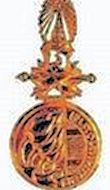
Zu National Artists (ศิลปินแห่งชาติ) werden ernannt:
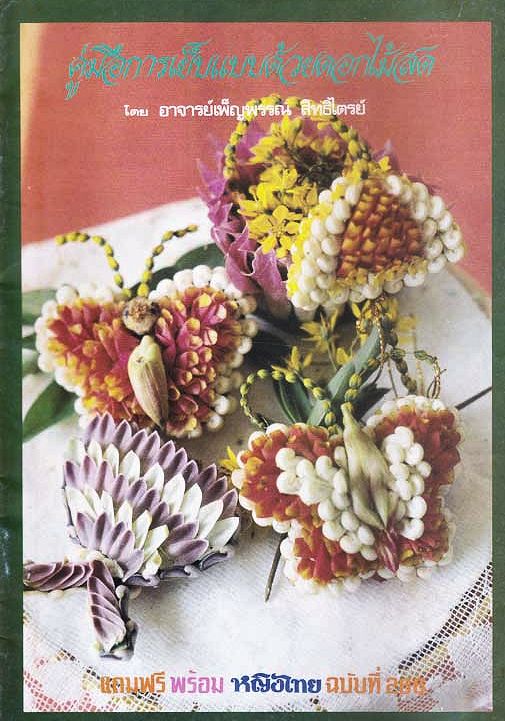
Abb.: Einbandtitel eines Buchs von Penphan Sithitrai
(นางเพ็ญพรรณ สิทธิไตรย์)
Fair use]

Abb.: Plakat für ein Workshop mit Woranan Chatchawaltipakorn (นายวรนันท์ ชัชวาลทิพากร)
[Fair use]
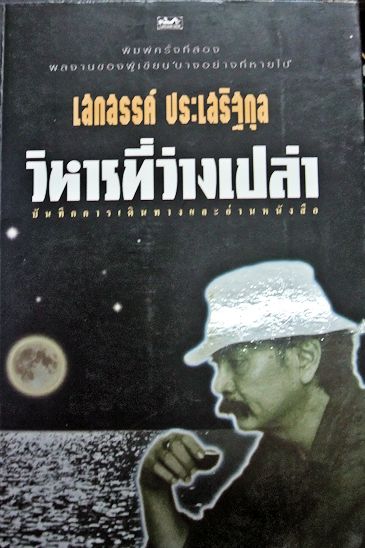
Abb.: Einbandtitel eines Buchs von Seksan Prasertkul
(นายเสกสรรค์ ประเสริฐกุล)
[Fair use]
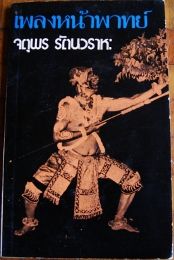
Abb.: Einbandtitel eines Buchs von Jatuporn Rattanawaraha
(นายจตุพร รัตนวราหะ)
[Fair use]
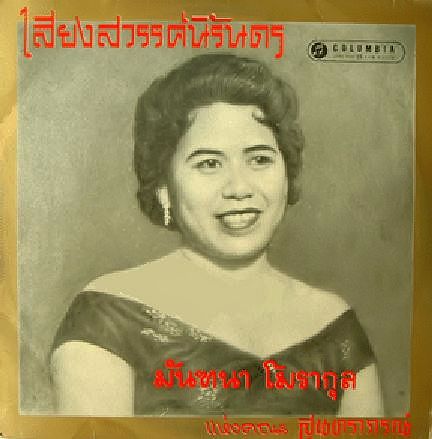
Abb.: Plattentitel von Manthana Morakul (นางมัณฑนา
โมรากุล)
[Fair use]
2009-03
Es erscheint das Musikvideo
จินตหรา พูนลาภ [Jintara Poonlarp] <1971 - >: ม็อบสีชมพู [Rosa Mob]. -- Eine humorvolle Anspielung auf die Rosa-Gewand-Mode nach der Krankenhausentlassung König Bhumipols in rosa Kleidung 2007-11.
Abb.: Musikvideo-Titel
[Fair use]
2009-03
Es erscheint der Aufsatz des Germanisten
เจตนา นาควัชระ [Chetana Nagavajara] <1937 - >: ทางสายกลางแห่งวรรณกรรมวิจารณ์ [The middle path in literary criticism]
Zitat:
"In recent times, apart from the fact that people who have been educated at university in the West act with missionary zeal on behalf of those countries where they studied, some Thai academics who work in Western universities always come back and visit home from time to time together with some new, ready-made analytical tools in the form of theories which they use to analyse to show us that Thai society is like that or like this as well as lecturing us about what Thailand should do or how it should approach certain issues, speaking in tones that might indicate they are the crowning glory of their country. And all I do is politely respond to them that, "If you miss home so much, then why don't you move back here and share in our suffering with us?"" [Übersetzt von der Herausgeberin in: Disturbing conventions : decentering Thai literary cultures / edited by Rachel V. Harrison. -- London : Rowman, 2014. -- 274 ; 23 cm. -- ISBN 9781783480142. -- S. 26
2009-03-01
Ex-Ministerpräsident Thaksin richtet über Satellit an seine Anhänger mehrere Fernsehansprachen.
2009-03-03

Die USA geben zu, dass sie in Thailand geheime Gefängnisse haben, in den Al-Kaida-Verdächtigte verhört werden und dem "Waterboarding" unterworfen werden.
Abb.: Vorführung von Waterboarding
[Bildquelle: Karl Gunnarsson. -- http://www.flickr.com/photos/37002439@N00/2538359898. -- Zugriff am 2012-01-13. -- Creative Commons Lizenz (Namensnennung, share alike)]
"Als Waterboarding wird eine Foltermethode des simulierten Ertränkens bezeichnet. Beim Opfer wird durch Ausnutzen des Würgereflexes physiologisch der Eindruck unmittelbar drohenden Ertrinkens hervorgerufen, indem die Atmung durch ein Tuch über Mund und Nase, das ständig mit Wasser übergossen wird, stark erschwert wird. Durch das Fixieren des Folteropfers in einer Position, in der sich der Kopf tiefer befindet als der restliche Körper, soll das Eindringen von Wasser in die Lungen und ein darauffolgendes tatsächliches Ertrinken verhindert werden.[1] Laut Berichten bricht der Widerstand der meisten Opfer in weniger als einer Minute.[2][3] Waterboarding gehört zu den Foltermethoden, die üblicherweise keine körperlichen Spuren hinterlassen (Weiße Folter), aber zu längerdauernden oder bleibenden psychischen Störungen führen können. Nachträgliche Beweise am Gefolterten selbst sind im Fall des Waterboardings daher nur selten zu erbringen."
[Quelle: http://de.wikipedia.org/wiki/Waterboarding. -- Zugriff am 2012-01-13]
2009-03-03


Bericht von US-Charge d' Affaires James F. Entwistle an das State Departement in Washington DC:
|
"SUBJECT: THAI MFA [Ministry of Foreign Affairs] PERMSEC
[Permanent Secretary] RAISES LESE MAJESTE WITH
AMBASSADOR MARCIEL AT ASEAN SUMMIT
1. (C) EAP [East Asia Pacific] Deputy Assistant Secretary and U.S. Ambassador for ASEAN Affairs Scot Marciel engaged Thai Ministry of Foreign Affairs (MFA) [กระทรวงการต่างประเทศ] Permanent Secretary Virasadki Futrakul [วีระศักดิ์ ฟูตระกูล] February 28 on the sidelines of the ASEAN Summit in Cha-am/Hua Hin ชะอำ/หัวหิน regarding U.S.-bilateral relations and ASEAN issues (septel). During the meeting, Virasadki provided Ambassador Marciel a non-paper on lese majeste in response to coverage of lese majeste-related developments in the recently-released Country Report on Human Rights Practices. Marciel gave no response to the non-paper but said that he would carry it back to Washington. 2. (C) Virasadki expressed concern with the recently released Human Rights Report. He explained that, under the criminal code, anybody can bring charges of lese majeste, but in the past King Bhumibol had been lenient and always granted clemency to foreigners convicted of this offense. Virasakdi stated that the RTG [Royal Thai Gouvernement] was very careful to ensure that this law was not misused; currently the RTG was reviewing who amongst the populace could bring charges of lese majeste. The RTG was reviewing the practices of EU countries with monarchies to see what types of reforms can be made. 3. (C) Virasadki urged that non-Thai should understand that lese majeste is a defensive mechanism to protect the institution of the monarchy, and that the institution of the monarchy was part and parcel of the Thai identity. He provided Ambassador Marciel with a note verbale on this topic. The text follows, with grammatical errors reproduced as in the original: BEGIN TEXT Thailand's Comments on the U.S. State Department's 2008 Human Rights Report
END TEXT" [Quelle: http://wikileaks.org/cable/2009/03/09BANGKOK520.html. -- Zugriff am 2013-02-20] |
2009-03-04

Internationaler Appell an den Ministerpräsidenten für eine Reform des Majestätsbeleidigungs-Strafrechts:
"His Excellency Abhisit Vejjajiva
Prime Minister
Office of the Prime Minister
Royal Government of Thailand
Bangkok, ThailandHonorable Prime Minister Abhisit,
As scholars and sympathetic observers of Thailand, we are extremely concerned about the recent legal actions taken against Thai and foreign citizens under the lese majeste law. It is unfortunate that the political crisis in Thailand has led to the deterioration of basic civil liberties.The frequent abuse of the lese majeste law against political opponents undermines democratic processes. Bringing charges against journalists, academics and other citizens for their views and actions simply because of allegations that they are offensive to the royal family prevents open discussion of important public issues. They illustrate the pitfall of the imprudent claims of loyalty to the monarchy. Instead of protecting reputations, these lese majeste cases generate heightened criticism of the monarchy and Thailand itself, both inside and outside the country.
Several suggestions have been made for reforms to the lese majeste law. His Majesty himself has said that criticism of the monarchy should be permissible. We are concerned lest, instead of listening to these constructive opinions, your government continue to use the law to suppress civil liberties and freedom of expression. Some members of your government are even calling for harsher punishments under the lese majeste law. All of these are done in the name of protecting the monarchy.
The experiences of many countries have proven that only truth, transparency, civic discussion, and democratic process can turn conflict of ideas into innovative and peaceful change. Suppression of ideas does not solve anything, but such is likely to do more harm than good to the monarchy.
With the greatest respect, we would like to urge you and your government to consider the following.
Sincerely Yours,
- Please stop seeking more suppressive measures against individuals, web sites, and the peaceful expressions of ideas.
- Please consider suggestions to reform the lese majeste law to prevent further abuses and to prevent the possibility of further damage to the international reputation of Thailand and the monarch.
- Please consider taking action to withdraw the current lese majeste charges, and working to secure the release of those already convicted under the lese majeste law. They are charged for expressing their ideas. This should not be a crime.
[Erstunterzeichner:]
James C. Scott, The Sterling Professor of Political Science and Anthropology and Environmental Studies Yale University, USA
Charles F. Keyes, Emeritus Professor of Anthropology and International Studies, University of Washington, USACraig J. Reynolds, College of Asia and the Pacific, The Australian National University, Australia
Robert Albritton, Professor, Political Science, University of Mississippi, USABarbara Watson Andaya, Professor of Southeast Asian History, University of Hawai’i at Manoa, USA
Leonard Y. Andaya, Professor of Southeast Asian History, University of Hawai'i at Manoa, USAArjun Appadurai, Goddard Professor of Media, Communication and Culture, New York University, USA
Lord Eric Avebury, Vice-Chair, Parliamentary Human Rights Group, United KingdomTrevor J. Barnes, Professor of Geography and Distinguished University Scholar, University of British Columbia, Canada
Peter F. Bell, Associate Professor of Economics, Sate University of New York,USAWalden Bello, Professor, Department of Political Science, University of the Philippines, Philippines
Katherine A. Bowie, Professor of Anthropology and Southeast Asian Studies, University of Wisconsin-Madison, USAMichael Burawoy, Professor of Sociology, University of California-Berkeley, USA
Hilary Charlesworth, Professor of International Law and Human Rights, Australian National University, AustraliaProfessor Noam Chomsky, Institute Professor (retired), Massachusette Institute of Technology (MIT), USA
Michael K. Connors, Senior Lecturer, Politics and Development Studies, La Trobe University, AustraliaArif Dirlik, Chair Professor of Chinese Studies, Chinese University of Hong Kong, Hong Kong
John Dugard, Distinguished Professor of Public International Law, University of Leiden, The NetherlandsGrant Evans, Research Fellow, Centre of Asian Studies, University of Hong Kong, Hong Kong
Edward Friedman, The Hawkins Chair, Professor of Political Science, University of Wisconsin-Madison,USASusan Stanford Friedman, Virginia Woolf Professor of English and Women’s Studies, University of Wisconsin-Madison, USA
Stuart Hall, Emeritus Professor of Sociology, The Open University, United KingdomDr Rachel Harrison, Senior Lecturer in Thai Cultural Studies, School of Oriental and African Studies, University of London, United Kingdom
Gillian Hart, Professor, Department of Geography, University of California, Berekeley, USARobert Hefner, Professor, Department of Anthropology, Boston University, USA
Michael Herzfeld, Professor of Anthropology, Harvard University, USAKevin Hewison, Professor, Department of Asian Studies and Director, Carolina Asia Center, University of North Carolina, Chapel Hill, USA
Philip Hirsch, Professor of Human Geography, University of Sydney, AustraliaPaul Hutchcroft, Professor and Head, Department of Political & Social Change, Research School of Pacific & Asian Studies, The
Australian National University, AustraliaPeter A. Jackson, Senior Fellow in Thai History, Research School of Pacific and Asian Studies, The Australian National University, Australia
Robin Jeffrey, Emeritus Professor, Australian National University and La Trobe University, AustraliaProfessor Sarah Joseph, Director, Castan Centre for Human Rights Law, Faculty of Law, Monash University, Australia
Ira Katznelson, Ruggles Professor of Political Science and History, Columbia University, USABen Kerkvliet, Emeritus Professor, Research School of Pacific and Asian Studies, Australian National University, Canberra, Australia
Ben Kiernan, A.Whitney Griswold Professor of History and Professor of International and Area Studies, Yale University, USASmitu Kothari, Director, Intercultural Resources, New Delhi, Visiting Professor, Tata Institute of Social Sciences, Mumbai, India
Margaret Levi, Professor of International Studies, Department of Political Science, University of Washington, USADr. Caroline Lucas, Member of the European Parliament, Leader of the Green Party of England and Wales, United Kingdom
Senator Francesco Martone, ItalyDuncan McCargo, Professor of Southeast Asian Politics, University of Leeds, United Kingdom
Anthony Milner, Basham Professor of Asian History, Australian National University, AustraliaDon Mitchell, Distinguished Professor of Geography, The Maxwell School, Syracuse University, USA
Frances Fox Piven, Distinguished Professor of Sociology and Political Science, Graduate School of the City University of New York, USAAnthony Reid, Professor, Asia Research Institute, National University of Singapore, Singapore
Garry Rodan, Professor of Politics & International Studies, and Director, Asia Research Centre, Murdoch University,AustraliaDr. Mohamed Suliman, Director, Institute for African Alternatives, United Kingdom
David Szanton, Emeritus Executive Director of International and Area Studies, University of California, Berkeley, USAStanley Jeyaraja Tambiah, The Esther and Sidney Rabb Professor (Emeritus) of Anthropology, Harvard University, USA
Professor Nicholas Tapp, Research School of Pacific and Asian Studies, Australian National University, AustraliaCarlyle A. Thayer, Professor, University College, University of New South Wales, Australia
Gillian Triggs, Professor and Dean, the Faculty of Law, University of Sydney, AustraliaImmanuel Wallerstein, Professor, Department of Sociology, Yale University, USA
Dr. Thomas Wallgren, Head, Department of Philosophy, University of Helsinki, FinlandMichael J. Watts, Chancellor's Professor, Department of Geography, University of California, Berkeley, USA"
[Quelle: http://asiapacific.anu.edu.au/newmandala/wp-content/uploads/2009/03/letter1.pdf. -- Zugriff am 2015-01-17]
Spätere Unterzeichner findet man unter: http://asiapacific.anu.edu.au/newmandala/wp-content/uploads/2009/03/additional-letter-signatories-14-march-2009.pdf. -- Zugriff am 2015-01-17
Die einzigen Unterzeichner an deutschen Universitäten sind
Dr Oliver Pye, Lecturer, Southeast Asian Studies, Institute of Oriental and Asian Studies, Bonn University, GERMANY
Barend Jan Terwiel, Professor Emeritus of Thai and Southeast Asian Studies, University of Hamburg, GERMANY
2009-03-05

Um die Wirtschaft anzukurbeln, nimmt China das höchste Defizit seit Gründung der Volksrepublik in Kauf. Das Defizit verdreifacht sich sogar im Vergleich zu dem Rekorddefizit vom Vorjahr auf insgesamt 950 Milliarden Yuan (110 Milliarden Euro).
2009-03-05
Premiere des Films Best of Times (ความจำสั้น แต่รักฉันยาว) von Yongyoot Thongkongtoon (ยงยุทธ ทองกองทุน, 1967 - )
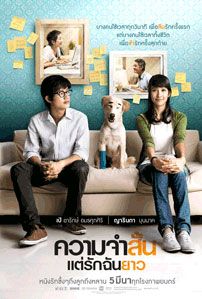
Abb.: Plakat
[Bildquelel: th.Wikipedia. -- Fair use]
|
"Best of Times (Thai: ความจำสั้น แต่รักฉันยาว, RTGS: Khwam Cham San Tae Rak Chan Yao) is a Thai romantic drama film directed by Yongyoot Thongkongtoon (ยงยุทธ ทองกองทุน, 1967 - ) and released by GTH (จีทีเอช) in 2009. Starring Arak Amornsupasiri (อารักษ์ อมรศุภศิริ, 1984 - ), Yarinda Bunnag (ญารินดา บุนนาค, 1980 - ), Krissana Sreadthatamrong (กฤษณ เศรษฐธำรงค์) and Sansanee Wattananukul (ศันสนีย์ วัฒนานุกูล, 1947 - ), it features the story of Keng (เก่ง), a young veterinarian who, during giving computer classes to a group of seniors as part of a community service sentence, comes to know an elderly couple, Jamras (จำรัส) and Sompit (สมพิศ), who are rediscovering romance late in life. As Keng helps Jamras and Somphit with their problems, he learns from them and forms a relationship with his former school crush and friend's ex-wife, Fai (ฝ้าย). The film received multiple national awards and was Thailand's submission to the 82nd Academy Award for Best Foreign Language Film." [Quelle: http://en.wikipedia.org/wiki/Best_of_Times_%282009_film%29. -- Zugriff am 2013-03-28] |
2009-03-10


Bericht von US-Botschafter Eric John an das Stete Department in Washington DC:
"SUBJECT: THAILAND: LESE MAJESTE DEBATE ENTERS PUBLIC
DOMAIN; WEBSITE MODERATOR ARRESTED UNDER COMPUTER CRIME ACT
[...]
WEB EDITOR ARRESTED, WEB COMMUNITY
WARNED4. (C) Police officers from the Crime Suppression Division (CSD) [กองบังคับการปราบปราม] arrested Executive Director Chiranuch Premchaiporn [จีรนุช เปรมชัยพร] of Prachatai.com [ประชาไท], an online news site not associated with any traditional media outlet, in a surprise raid on March 6 that rattled the online news community. Chiranuch was released on bail the same evening. The police cited Article 15 of the Computer Crime Act (CCA), which states that any service provider intentionally supporting or consenting to a number of offenses related to dissemination of material, including posting content harmful to national security, is subject to imprisonment of up to five years or a fine of up to 100,000 baht ($2,777). The arrest featured prominently in Thai-language media reports on March 7, with many print editions featuring the story on the front-page. (Note: Prachatai.com was created in 2004 to counter Thaksin-era online censorship and perceived corporate and political bias in the print media. According to Chiranuch, the site has daily averages of 20-30,000 readers and 300,000 page hits. End Note.)
6. (C) The exact source of the charge remained unclear, but Chiranuch told us that the police-drafted statement she signed on March 6 contained an excerpt from a posting by Noppawan Bangudonsuk [sic!, richtig: Tangudomsuk - นพวรรณ ตั้งอุดมสุข] -- a young woman from a prominent family who was arrested on January 26 after posting second-hand anti-monarchy comments to her personal blog and to Prachatai.com. Noppawan was later released after posting bail of two million Baht (approximately $57,000). 7. (SBU) Ironically, the raid on Prachatai.com took place on the heels of PM Abhisit Vejjajiva's [อภิสิทธิ์ เวชชาชีวะ, 1964 - ] pledge to ensure media freedom at Asia News Network's (ANN) 10th anniversary celebration in Bangkok earlier on March 6. (Note: ANN is an alliance of 20 newspapers in 17 countries, and claims to be the biggest media alliance worldwide in terms of readership. End Note.) Media coverage of the celebration quoted Abhisit as acknowledging Thailand's decline in media freedom, asserting the need to clarify standards for enforcement of the lese majeste provision of law, and promising new laws and regulations under consideration will protect media professionals and increase information available to the public.
8. (C/NF) Australian author Harry Nicolaides [1967/68 - ] received a royal pardon on February 18, and he returned home to Australia on February 21. The Thai Criminal Court had sentenced Nicolaides on January 19 to three years' imprisonment for lese majeste, based on his 2005 novel Verisimilitude, which had a one paragraph account of personal shortcomings of a fictional Crown Prince that closely tracked the life of the current Crown Prince. Nicolaides was promoted by some foreign commentators as a prisoner of conscience/free speech, but the Australian embassy walked a fine line in quietly working for his pardon, aware that some of Nicolaides' online writings seemed to embrace pedophilic tendencies. DUAL NATIONAL ACADEMIC FLEES, LAUNCHES RED SIAM MANIFESTO 9. (C) Chulalongkorn political science professor Giles "Ji" Ungpakorn [ใจ อึ๊งภากรณ์, 1953 - ], charged with lese majeste on January 20 for his 2007 book "A Coup for the Rich," fled for the U.K. on February 9. In a meeting with us days earlier, dual UK-Thai citizen Ungpakorn appeared genuinely concerned for his well-being, and confided that the idea of spending any time in prison "was just horrible." Upon his arrival in the U.K., Ungpakorn released a political manifesto entitled "Red Siam." The manifesto attacked the historical role of the monarchy and the King personally and called for the establishment of a Thai republic; while the manifesto is in keeping with the tenor of Ji's Marxist writings over three decades, he had not previously attacked the monarchy so directly. Thai media reported that Foreign Minister Kasit Piromya [กษิต ภิรมย์, 1944 - ] on March 9 indicated publicly that Abhisit may engage the British government about the possibility of extraditing Ungpakorn on the charge of lese majeste during his visit to London to attend the G-20 summit on April 2. INTERNATIONAL SCHOLARS CALL FOR OPEN DEBATE OF LAW 10. (C) The Foreign Correspondents Club of Thailand (FCCT) hosted its first web-based press conference on March 4, featuring U.S.-based professor Thongchai Winichakul [ธงชัย วินิจจะกูล] and Australian professor Andrew Walker, who called for an open debate about the lese majeste provision of the criminal code. The video conference was accompanied by the release of a draft letter from 50 international scholars/activists to Abhisit that urged the RTG [Royal Thai Government] to reform the law that generated "heightened criticism of the monarchy" and encouraged "frequent abuse... against political opponents." FCCT board chairman and journalist Marwaan Macan-Markar told us on March 4 that he worried that the FCCT could be charged for helping to disseminate views offensive to the monarchy.
11. (C) A number of international commentators, including a landmark December 2008 edition of the Economist, have criticized King Bhumibol for not intervening in the current burst of lese majeste activity. In fact, the King's most extensive comments on the matter, given during his annual birthday speech in 2005, put him on the side of minimal use of a tool that sources close to the palace claim that he and his daughter Princess Sirindhorn [มหาจักรีสิรินธร, 1955 - ] do not support. (note: The implied subtext of the December 2005 speech was that since the King himself was open to criticism, the PM at the time, Thaksin [ทักษิณ ชินวัตร, 1949 - ], should also be.)
13. (C) Others members of the royal family and those close to it, however, appear to have a different view, particularly of criticism not directed at the King but the institution itself and the other two individuals covered by lese majeste: the Queen and Crown Prince. While it has generally long been understood that foreigners who show remorse will be pardoned by the King, the standards for Thai citizens appear different. When a U.S. businessman privately raised concerns of how the cases against Nicolaides and Ji Ungpakorn were damaging Thailand's image with members of the Privy Council [คณะองคมนตรีไทย] in early February, Privy Council President Prem [Prem Tinsulanonda - เปรม ติณสูลานนท์, 1920 - ] replied: "There will be movement on Nicolaides soon. But Ji is Thai." Thai citizen and United Front for Democracy Against Dictatorship (UDD) [แนวร่วมประชาธิปไตยต่อต้านเผด็จการแห่งชาติ] supporter Bunyuen Prasoetying [บุญยืน ประเสริฐยิ่ง] was sentenced to six years' imprisonment in November 2008 after committing lese majeste; there is no indication at this time that a pardon is in the offing. JOHN" [Quelle: http://wikileaks.org/cable/2009/03/09BANGKOK610.html. -- Zugriff am 2013-02-21] |
2009-03-15
Tod des Schriftstellers Narong "Rong" Wongsawan (’รงค์ วงษ์สวรรค์, 1932 - 2009).
Abb.: Zeitschriftentitel über Narong "Rong" Wongsawan (’รงค์ วงษ์สวรรค์)
[Fair use]Ampha Otrakul [อําภา โอตระกูล, 1934 - ] über den Schriftsteller:
"RONG WONGSAWAN [’รงค์ วงษ์สวรรค์], geb. 1932, gilt seit 15 Jahren als profilierter, freier Schriftsteller. Sein Name ist eng verbunden mit einem neuen, frischen Sprachstil, der ihm in den 60-er Jahren zum Durchbruch zu allgemeiner Anerkennung verhalf. Sein wegen des ungewöhnlichen Sprachstils aufsehenerregendes Werk war eine Reihe von Liebesgeschichten vom Land. In seinen Schriftwerken finden sich bis dahin unbekannte neue sprachliche Versuche, neue Wortbildungen und Ausdrucksweisen, die einerseits sehr direkt sind, andererseits vielerlei gedankliche Assoziationen hervorrufen. Viele von ihm neu geschaffenen Ausdrücke fanden großen Anklang, besonders bei der jungen Generation."
[Quelle: Kurzgeschichten aus Thailand / ausgewählt und übersetzt von Ampha Otrakul [อําภา โอตระกูล, 1934 - ]. -- Bangkok : Chalermit, [1982]. -- 312 S. ; 20 cm. -- ISBN 974-7390-08-6. -- S. 123]
2009-03-16 - 2009-03-22
Erstes SAT Bangkok Open (später: Chang-Sat Bangkok Open) (Tennis). Danai Udomchoke (ดนัย อุดมโชค, 1981 - ) wird Zweiter.

Abb.: Danai Udomchoke (ดนัย อุดมโชค),
2007
[Bildquelle: Matana and Jes. --
http://www.flickr.com/photos/matana/971190825/.
-- Zugriff am 2013-04-20. --
Creative Commons
Lizenz (Namensnennung, keine kommerzielel Nutzung, keine Bearbeitung)]
2009-03-17


Einweihung durch Prinzessin Maha Chakri Sirindhorn (ศาสตราจารย์กิตติมศักดิ์ ดร. พลเอกหญิง พลเรือเอกหญิง พลอากาศเอกหญิง สมเด็จพระเทพรัตนราชสุดา เจ้าฟ้ามหาจักรีสิรินธร รัฐสีมาคุณากรปิยชาติ สยามบรมราชกุมารี, 1955 - ) des von König Bhumibol der Stadt Lausanne (Schweiz) anlässlich seines 60. Thronjubiläums geschenkten Pavillons. König Bhumibol hatte seine Kindheit, Jugend und Studienzeit in Lausanne gelebt. Der Pavillon befindet sich im Parc du Denantou.
Abb.: Bhumibol-Pavillon, Lausanne, 2007
[Bildquelle: Thomas Guignnard. -- http://www.flickr.com/photos/timtom/1418224590/. -- Zugriff am 2012-04-13. -- Creative Commons Lizenz (Namensnennung, keine kommerzielle Nutzung, share alike)]
Abb.: Lage von Lausanne (Schweiz)
[Bildquelle: OpenStreetMap. -- Creative Commons Lizenz (Namensnennung, share alike)]
Abb.: Lage des Parc du Denantou
[Bildquelle: OpenStreetMap. -- Creative Commons Lizenz (Namensnennung, share alike)]
2009-03-18
Dessous auf einer Modeschau in Bangkok:
Abb.: Modeschau, Bangkok, 2009-03-18
[Bildquelle: kkn2009. -- http://www.flickr.com/photos/32429254@N07/3365582477. -- Zugriff am 2013-10-17. -- Creative Commons Lizenz (Namensnennung, keine kommerzielle Nutzung, keine Bearbeitung)]
Abb.: Modeschau, Bangkok, 2009-03-18
[Bildquelle: kkn2009. -- http://www.flickr.com/photos/32429254@N07/3365582447. -- Zugriff am 2013-10-17. -- Creative Commons Lizenz (Namensnennung, keine kommerzielle Nutzung, keine Bearbeitung)]
Abb.: Modeschau, Bangkok, 2009-03-18
[Bildquelle: kkn2009. -- http://www.flickr.com/photos/kkn2009/3365582481. -- Zugriff am 2013-10-17. -- Creative Commons Lizenz (Namensnennung, keine kommerzielle Nutzung, keine Bearbeitung)]
2009-03-19
Premiere des Films The Meat Grinder (เชือดก่อนชิม) von Tiwa Moeithaisong (ทิวา เมยไธสง)
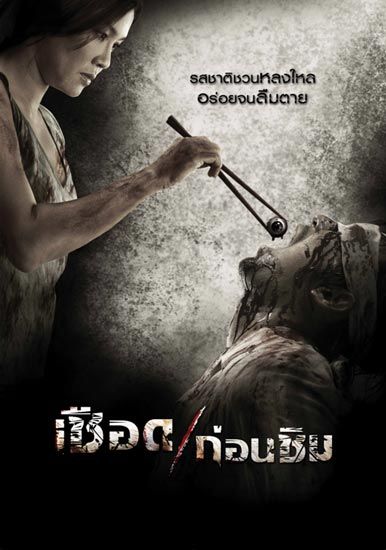
Abb.: Plakat
[Bildquelle: Wikiepdia. -- Fair use]
|
"The Meat Grinder in (Thai: เชือดก่อนชิม pronounced "Cheuat Gon Chim") directed in 2009 by Thai film director Tiwa Moeithaisong (ทิวา เมยไธสง) is a horror movie tackling cannibalism. SynopsisBuss (Mai Charoenpura) is a disturbed woman who hears voices in her head is tormented by visions. Having been taught some pretty dubious and unconventional food preparation and cooking skills by her mother, she decides to open up a noodle stall, using the body of a man left over from a riot as the main ingredient. Soon enough, the customers are turning up in droves for her delicious meals, and life is starting to look good after a nice young man takes an interest in her. However, her past comes back to haunt her, and as her mental state breaks down, yet more people end up on the chopping block or hanging up on meat hooks in her basement. The film also tackles the themes of mental illness and the mistreatment of women, with Buss' behavior being depicted as being part of an ongoing cycle of violence that she suffered as a child, and which she is now passing on to her own daughter. Cast
Meat Grinder was released in March 2009, just a few months before the ratings system came into effect in Thailand. After beef noodle shop owners and vendors protested, the movie was reportedly ordered to cut certain scenes. The title for the Thai main release was also changed from "Guay-dteow Neua Kon" (ก๋วยเตี๋ยว เนื้อ คน), literally "human meat noodles" to "Cheuat Gon Chim" (เชือด ก่อน ชิม), "carve before tasting", to remove direct reference to noodles, a staple in Thai food.[1] Award nominationsIn 2010, the film was nominated for three awards at the Thailand National Film Association Awards (รางวัลภาพยนตร์แห่งชาติ สุพรรณหงส์)
[Quelle: http://en.wikipedia.org/wiki/Meat_Grinder. -- Zugriff am 2013-03-28] |
2009-03-26
Die United Front for Democracy Against Dictatorship (UDD, แนวร่วมประชาธิปไตยต่อต้านเผด็จการแห่งชาติ - นปช., Rothemden - เสื้อแดง) errichtet vor dem Government House (ทำเนียบรัฐบาล) ein permanentes Protest-Camp
Abb.: Lage des Government House (ทำเนียบรัฐบาล)
[Bildquelle: OpenStreetMap. -- Creative Commons Lizenz (Namensnennung, share alike)]
2009-03-26
Uraufführung der Oper The Lunch Box in Hobart (Australien). Komponist: Thanapoom Sirichang (ธนภูมิ ศิริช่าง, 1981 - ) ; Libretto: Bringkop Vora-Urai (บฤงคพ วรอุไร).
Abb.: Lage von Hobart
[Bildquelle: OpenStreetMap. -- Creative Commons Lizenz (Namensnennung, share alike)]
"The Lunch Box is a chamber opera by Thai composer Thanapoom Sirichang (ธนภูมิ ศิริช่าง, 1981 - ) and Thai librettist Bringkop Vora-Urai (บฤงคพ วรอุไร). Composed entirely in Tasmania under the guidance of IHOS Artistic Director Constantine Koukias (1965 . ), The Lunch Box may be the first opera sung in Thai to blend traditional Thai music and contemporary Western opera. A Buddhist tale
The Lunch Box tells the story of a mother's devotion to her only son, a fundamentally good farmer whose rage at the untimely death of his father has tragic consequences. This much-loved Thai Buddhist folk tale (ก่องข้าวน้อยฆ่าแม่) is believed by the librettist to be based on an actual incident that occurred in Thailand 300 years ago.[1]
Composing western opera for Thai voicesComposition challenges included using the Western staff and notation for Thai music, which is usually notated quite differently, and writing for a tonal language such as Thai, in which changing the pitch of the word can change its meaning.[2]
PremiereThe opera, for two singers and ensemble, was commissioned by IHOS Music Theatre and Opera, and premiered in Hobart, Tasmania, Australia, on 26 March 2009 as part of the 2009 10 Days on the Island Festival. The Hobart production featured soprano Monique Klongtruadroke and baritone Saran Suebsantiwongse, both of whom have been trained in the Western tradition and have sung with the Bangkok Opera (บางกอกโอเปร่า). The "minimalist and bold"[3] portable set evoking a Thai rice field was created by the production's Sydney-based Dutch Director and Designer Joey Ruigrok van der Werven. The Western-style ensemble, which is incorporated into the stage design, comprises violin, clarinet, cello, flute, keyboards and percussion, but a gong and water percussion recall Thai rural scenes.[4] The premiere season was conducted by Tasmanian conductor Michael Lampard (1986 - )."
[Quelle: http://en.wikipedia.org/wiki/The_Lunch_Box. -- Zugriff am 22012-06-15]
2009-03-26
Premiere des Films Khan Kluay 2 (ก้านกล้วย 2) von Taweelap Srivuthivong (ทวีลาภ ศรีวุฒิวงศ์)
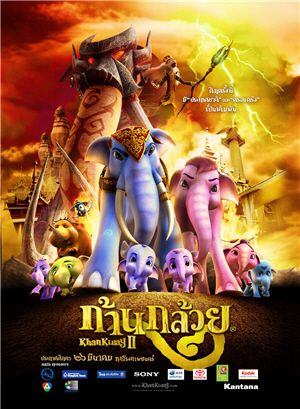
Abb.: Plakat
[Bildquelle: th.Wikipedia. -- Fair use]
|
"Khan Kluay 2 is a three-dimensional animated movie from Thailand, directed by Taweelap Srivuthivong (ทวีลาภ ศรีวุฒิวงศ์) and released in 2009. It is the sequel to Khan Kluay (ก้านกล้วย) and follows the further adventures of the war elephant of King Naresuan the Great (สมเด็จพระนเรศวรมหาราช, 1555 - 1605). It is set during the war between Ayutthaya (อาณาจักรอยุธยา) and Bago (တောင်ငူခေတ်). Its theme is the need to protect family and country. The movie grossed 79 million baht. [Die Beschreibung des Inhalts in Thai-English ist ein unverständliches Gestotter und darum hier weggelassen] Cast
[Quelle: http://en.wikipedia.org/wiki/Khan_Kluay_2. -- Zugriff am 2013-03-28] |
2009-04
Die Regierung proklamiert die Five Fences Strategy im Kampf gegen Drogenhandel und Drogenkonsum. Die five fences sind:
- the border fence
- the community fence
- the social fence
- the school fence
- the family fence
2009-04-03
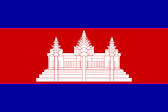
Kampf kambodschanischer und thailändischer Soldaten wegen Prasat Preah Vihear (ប្រាសាទព្រះវិហារ / ปราสาทพระวิหาร). Zuvor waren ca. 100 Thai-Soldaten auf das umstrittene Territorium eingedrungen. Ergebnis: je zwei kambodschanische und thailändische getötete Soldaten, mehrere Verwundete. Thailand schließt alle Zugänge zur Tempelruine.
Kambodscha hat über 3.000 Soldaten zusammengezogen, Thailand 2.000 Soldaten auf Pha Mor E-Daeng (ผามออีแดง).
Kambodscha fordert von Thailand US$ 2,1 Mio. Schadenersatz, da die Zerstörung eines Markts durch thailändisches schweres Geschütz 319 Familien ihres Lebensunterhalts beraubt habe. Thailand lehnt die Forderung ab.
Abb.: Pha Mor E-Daeng (ผามออีแดง)
[Bildquelle: th.Wikipedia. -- Public domain]
Abb.: Lage von Pha Mor E-Daeng (ผามออีแดง)
[Bildquelle: OpenStreetMap. -- Creative Commons Lizenz (Namensnennung, share alike)]
2009-04-03

Najib Razak (Seri Mohd Najib bin Tun Haji Abdul Razak, 1953 - ) wird Ministerpräsident Malaysias.
Abb.: Malaysia
[Bildquelel: CIA. -- Public domain]
Abb.: Seri Mohd Najib bin Tun Haji Abdul Razak / von Murray Webb (1947 - ), 2009
[Bildquelle: Najib Razak. 28 October 2009. Webb, Murray, 1947- :[Digital caricatures published from 29 July 2005 onwards (2006, 2007, 2008). Includes a selection of digital caricatures published from 2002 and up to July 2005.]. Ref: DCDL-0012721. Alexander Turnbull Library, Wellington, New Zealand. http://natlib.govt.nz/records/22719364. -- Zugriff am 2013-03-09. -- "You can copy this item for personal use, share it, and post it on a blog or website. It cannot be used commercially without permission"]
2009-04-03

Suwicha Takor (สุวิชา ท่าค้อ), 34, wird wegen Majestätsbeleidigung (lèse-majesté) und "missbräuchlicher Computernutzung" zu 10 Jahren Haft verurteilt. Er hatte über das Internet Bilder verbreitet, die angeblich beleidigend für den Kronprinzen sind. Am 29. Juni 2010 wurde Suwicha vom König amnestiert.
"Suwicha Thakor (สุวิชา ท่าค้อ) was arrested on 14 January 2009 on suspicion of posting comments on the Internet that insulted the monarchy. He is an engineer, with 3 children, and was arrested in Nakorn Phanom (นครพนม) and transported to Bangkok. He is accused of having posted insults to the king and his aides. His arrest coincided with a speech by Prime Minister Abhisit Vejjajiva who claimed to support freedoms but claimed that the monarchy had to be protected while adding that the lèse majesté law should not be abused. Bloomberg reported in mid-March 2009 that Suwicha had been twice refused bail but remained incarcerated and defiant. By the end of March, the Thai Netizen Network (27 March 2009: “First verdict on CCA-LM is scheduled for the accused Internet user on April 3, 2009″) reported Suwicha, detained at Klong Prem prison (คลองเปรม), was “prosecuted” on 26 March 2009. The report states that, “Since the accused has pleaded guilty therefore no trial will be taken. The verdict is scheduled on April 3, 2009 at 9 am. onwards at the Criminal Court, Ratchadapisek Road.” It seems that he has been prosecuted under the Computer Crime Act. It seems that Suwicha will soon be sentenced. Pleading guilty sometimes results in bail being granted and sentences being halved.
Suwicha convicted: The Nation (3 April 2009) reported that Suwicha has been convicted and sentenced to a long jail term: “The Criminal Court Friday sentenced a man to ten year imprisonment for posting a picture deemed insulting the monarchy on a website. Initially, Suwicha Thakho was sentenced to be jailed for 20 years but the court commuted the jail term by half after he pleaded guilty. He was charged with violating Article 112 of the Criminal Code and violating the computer crime act.”"
[Quelle: http://thaipoliticalprisoners.wordpress.com/decidedcases/suwicha-thakor_1/. -- Zugriff am 2012-01-13]
2009-04-08
Über 100.000 Rothemden (เสื้อแดง) protestieren in Bangkok. In der Nacht blockieren Taxi- und Motorradtaxi-Fahrer den Verkehr in Bangkok. In ca. einjem Dutzend Provinzhauptstädten protestieren Rothemden ebenfalls.
2009-04-09
Premiere des Films Buppah Rahtree 3.1 (บุปผาราตรี 3.1) von Yuthlert Sippapak (ยุทธเลิศ สิปปภาค, 1966 - )
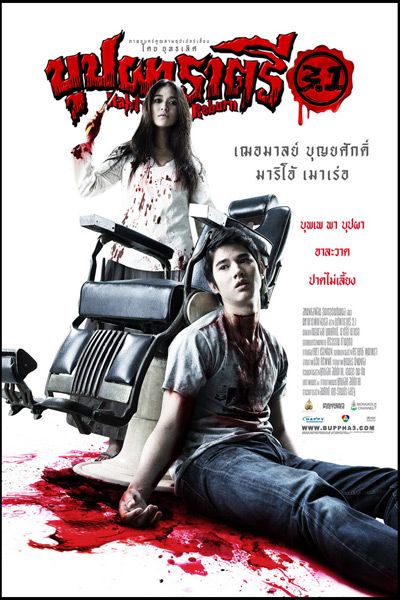
Abb.: Plakat
[Bildquelle: Wikipedia. -- Fair use]
|
"Rahtree Reborn (Thai: บุปผาราตรี 3.1) (also known as Buppah Rahtree 3.1) is a 2009 Thai comedy-horror film written and directed by Yuthlert Sippapak (ยุทธเลิศ สิปปภาค, 1966 - ). It is a sequel to the 2005 film, Buppah Rahtree Phase 2: Rahtree Returns (บุปผาราตรี เฟส 2). [1][2] PlotTen years passing by, Buppha (บุปผา) is reincarnated as a young girl named Pla (ปลา) who is abandoned by her mother, leaving her with her barber stepfather, who often beats her in his anger. As a result, she becomes a problem child who is bullied by her classmates at school. One day, she takes a razor from her stepfather's barbershop and starts attacking people at school, after which she leaves and goes to Buppha's apartment, where she unexpectedly encounters a man who is masturbating. Pla is murdered by him and becomes a ghost which also haunts Buppha's apartment, and she awakes Buppha’s ghost and uses her to take her revenge against all men. After word gets out that the apartment block is haunted, the unoccupied flats become an illegal casino, and the good-looking Rung (หรั่ง), who has a sixth sense which enables him to see ghosts, moves in after his girlfriend breaks up with him. The death toll in the apartment block rises, and Rung and his friends are also chased by the girl’s ghost, but one day, Rung meets Buppha, who used to be his tutor when he was a kid, in the communal space in the building. Soon, he falls in love with her. However, Rang isn't aware that his crush indeed is the haunting and dangerous spirit that he needs to avoid. But he is too late and his sweet dream turns to nightmare as Buppha is now on the hunt again. Cast
[Quelle: http://en.wikipedia.org/wiki/Rahtree_Reborn. -- Zugriff am 2013-03-28] |
2009-04-11
Demonstranten der United Front for Democracy Against Dictatorship (UDD) (แนวร่วมประชาธิปไตยต่อต้านเผด็จการแห่งชาติ; นปช.) blockieren das ASEAN-Gipfeltreffen in Pattaya (พัทยา). Das Gipfeltreffen wird abgesagt.
Abb.: Lage von Pattaya (พัทยา)
[Bildquelle: OpenStreetMap. -- Creative Commons Lizenz (Namensnennung, share alike)]
Abb.: ASEAN-Gipfeltreffen in Pattaya (พัทยา), 2009
[Bildquelle: ปรัชญา สิงห์โต. -- http://www.flickr.com/photos/iannnnn/3432276274/. -- Zugriff am 2012-01-13. -- Creative Commons Lizenz (Namensnennung, keine kommerzielle Nutzung]
"The protests, led by the red-shirted National United Front of Democracy Against Dictatorship (UDD) expanded to Pattaya, the site of the 14th ASEAN summit a barricade blocking the transport of foreign leaders. The Peoples Rebublic of China's leader was blocked from leaving his hotel by the protesting taxi drivers, Thaksin's supporters. In the afternoon, while the red-shirted protesters were heading to the hotel, the site of the summit, violent clashes occurred between the UDD and blue-shirted government supporters on the way to the hotel. The Straits Times reported that both sides used sticks, stones, clubs, molotov cocktails, and "small bombs" in the clashes. The protests and clashes escalated. The red-shirted protesters finally stormed the hotel building, causing the summit to be cancelled. Abhisit declared a state of emergency in the areas of Pattaya and Chonburi on April 11. Visiting leaders were evacuated from the venue by helicopter to a nearby military airbase that had been Suvarnabhumi's replacement during the PAD's airport sieges of 2008. Legislation authorizing emergency decrees was originally drafted and pushed through Parliament in 2005 by the Thaksin government, provoking charges of authoritarianism at the time by the Democrats. The decree was used previously by Samak's government, coping with PAD protest. After military personnel took control, the red-shirt demonstrators returned and dispersed."
[Quelle: http://en.wikipedia.org/wiki/2008%E2%80%932010_Thai_political_crisis#Pattaya_protests. -- Zugriff am 2012-01-13]
2009-04-12 - 2009-04-14
Blutiger Sonkran (สงกรานต์เลือด): Songkran-Unruhen in Bangkok: Aufstand der United Front for Democracy Against Dictatorship (UDD) (แนวร่วมประชาธิปไตยต่อต้านเผด็จการแห่งชาติ; นปช.).
Abb.: Mit dem Maschinengewehr gegen die Unterprivilegierten. Bangkok, April 2009
[Bildquelle: Ronn aka "Blue" Aldaman. -- http://www.flickr.com/photos/12392252@N03/3450112182/. -- Zugriff am 2012-01-13. -- Creative Commons Lizenz (Namensnennung, keine kommerzielle Nutzung, keine Bearbeitung)]
"As the week-long Songkran (สงกรานต์, Thai New Year) holiday began, protests escalated in Bangkok. Protesters in red shirts used cars, buses, and in one location LPG tankers to take control of several locations in central Bangkok. Small clashes began apparently between anti-government and government supporters, and the general population. At a demonstration in front of Prem's (เปรม ติณสูลานนท์) residence, an angry woman wearing a yellow shirt, the royal color, plunged her car into a crowd of UDD protesters before driving away. Abhisit declared a state of emergency for Bangkok and surrounding areas due to the heightened escalation of tension and denounced the anti-government protesters as "national enemies". These clashes emerged in locations where control had been taken over by the demonstrators.
Prime Minister Abhisit Vejjajiva declared another state of emergency in Bangkok and surrounding areas on 12 April 2009. Abhisit also issued a decree that empowered the government to censor television broadcasts. A television journalist reported that he was ordered not to show images damaging to the military or government. Thaksin, who daily showed his live broadcast on a D-Station television, showing support for his loyalists, calling for the overthrow of the government, now began to urge the King Bhumibol to intervene and end the showdown.
Ministry of Interior (กระทรวงมหาดไทย) riotOn April 12, the tension ran high after the authority arrested leaders of the red-shirts who stormed the summit site in Pattaya (พัทยา). The protesters began to block of the Criminal Court, aiming at releasing their leader. In the afternoon, after the declaration of state emergency at the Ministry of Interior, hundreds of protesters who had blocked the gates of the Ministry, eventually broke out the ministry's gates. Abhisit and members of his cabinet were followed by the protesters. The premier's car and his secretary's car were under siege and hit. Abhisit escaped safely while his secretary and his driver became victimized, and their car's windows were all broken. Among those with serious injuries were some of the premier's security guards who were military, one of them was 'held' and was 'presented' to the red protesters on their stage.
Despite the state of emergency, large crowds of protesters continued to meet on the streets. After the attack of Abhisit's car at the Interior Ministry after declaring the state of emergency. A large crowd gathered outside the prime minister's office and barricades were constructed in an attempt to block access by the military. At one point protesters gained access to the Interior Ministry, in a confrontation with army units where several warning shots were fired, and they barricaded key road junctions and at least one railway. The anti-government protesters commandeered buses and two armored cars and blocked access to key government offices, some of them made ready by arming themselves with klewang and petrol bombs. According to BBC news, at least two people were killed in the protests and violent scuffles which had already broken out between the army and protestors with several people arrested while the government denied this report.
Thai New Year eventsIn a pre-dawn raid on Monday April 13, Thai soldiers in full combat kit used tear gas and fired live rounds and training rounds from automatic weapons to clear protesters from the Din Daeng (ดินแดง) intersection near the Victory Monument in central Bangkok, injuring at least 70 people. The Army later claimed that live rounds were only fired into the air while training rounds were fired at the crowd. Human Rights Watch confirmed that there are some cases where the Army fired live ammunition directly at protesters, but that this only occurred when military forces approached protesters throwing Molotov bombs and improvised grenades, firing slingshots, and shooting guns at the troops. The UDD claimed one protester died from gunshot wounds sustained during the military's attack. However, the Army later claimed that the wound was not caused by an M-16, the standard Army rifle. Also on Monday the government ordered the blocking of satellite news station D Station, an affiliate of the UDD which, at the time, was broadcasting the clashes. Several community radio stations were shut down and searched upon suspicion of being supporters of the UDD. Violent clashes at numerous locations in Bangkok continued while arrest warrants were issued for Thaksin and 13 protest leaders. Many protest leaders voluntarily gave themselves in to police on 14 April 2009, ending the violence. The demonstrators at the main site, near the Government House (ทำเนียบรัฐบาล), agreed to suspend their activity peacefully. Demonstrators were sent back to the provinces by government's buses. Government House protesters were identified and had their photographs taken prior to being released. Soon afterwards, Abhisit revoked Thaksin's ordinary passport (Abhisit had revoked Thaksin's diplomatic passport shortly after taking office) and issued warrants for dozens of other protest leaders.
On 21 April, Abhisit declared a "media war" against the UDD's claims. He also announced the public distribution of millions of VCDs documenting the government's views on the unrest. At the time, the government's emergency and censorship decrees were still in place.
The state of emergency, but not the censorship decree, was lifted on 24 April.
Abhisit's treatment of the UDD prompted criticisms that he applied one standard for his critics and another standard for his PAD (พันธมิตรประชาชนเพื่อประชาธิปไตย) supporters. The Asian Human Rights Commission noted "The obvious differences in how the yellow shirts and red shirts have been treated will only encourage government opponents to resort to increasingly extralegal means to get their way." At the time, warrants had not yet been issued for the PAD's airport seizures that occurred months before, while warrants had been issued for the UDD hours after the military commenced its crackdown.
Deaths, injuries, and damageAccording to government figures, over 120 people were injured in the unrest, most of them UDD demonstrators. At least 1 UDD protester was injured from gunshot wounds sustained during the military's attack in Din Daeng, although the Army claimed the wound was not caused by their standard firearm. The UDD claimed that at least 6 demonstrators were killed in the unrest and their bodies hauled away by the military, although the Army rejected the claim. The dead bodies of 2 UDD protesters were found floating in the Chao Phraya River (แม่น้ำเจ้าพระยา), their hands tied behind their backs and their bodies badly beaten, although police had yet to conclude whether their murders were politically motivated. Despite the claims, Army chief Anupong Paochinda (อนุพงษ์ เผ่าจินดา) swore on his life that no lives were lost as a result of his security operations.
Abb.: Lage von Din Daeng (ดินแดง)
[Bildquelle: OpenStreetMap. -- Creative Commons Lizenz (Namensnennung, share alike)]Abhisit aide Satit Wongnontaey claimed that two Bangkok residents were shot dead by red shirted protesters in clashes in Din Daeng. The Bangkok Metropolitan Administration (กรุงเทพมหานคร) estimated that it had incurred 10 million Baht (approximately 300,000 USD) in property damages, including 31 damaged and burned buses. Standard & Poor's lowered Thailand's local currency rating to "A-" from "A", although Finance Minister Korn Chatikavanij (กรณ์ จาติกวณิช) claimed this would increase the government's borrowing cost minimally."
[Quelle: http://en.wikipedia.org/wiki/2008%E2%80%932010_Thai_political_crisis#Thai_New_Year_events. -- Zugriff am 2012-01-13]
2009-04-13
Zehntausend Soldaten werden in Bangkok zusammengezogen, um die Stadt von Rothemden (เสื้อแดง) zu "reinigen".
2009-04-17
PAD-Führer und Medien-Zar Sondhi Limthongkul (สนธิ ลิ้มทองกุล / 林明達, 1947) überlebt einen Anschlag.
Abb.: Sondhi Limthongkul (สนธิ ลิ้มทองกุล / 林明達), 2008
[Bildquelle: 2T / Wikimedia. -- GNU FDLicense]
"Sondhi Limthongkul (สนธิ ลิ้มทองกุล / 林明達, 1947), leader of the People's Alliance for Democracy (พันธมิตรประชาชนเพื่อประชาธิปไตย), was shot early in the morning of 17 April 2009. Gunmen firing M-16 and AK-47 rifles shot out his tires at a petrol station and sprayed over 100 bullets into Sondhi’s car, wounding Sondhi and seriously wounding his driver. The attackers escaped the scene when Sondhi's followers in another car opened fire on them. Sondhi suffered one wound to the head but was conscious, standing, and lucid before being sent to the hospital for surgery. Sondhi survived the surgery and was visited by relatives afterwards. Sondhi's son, Jittanart Limthongkul, blamed factions within the military and the Abhisit government of being behind the assassination attempt:
"A new form of war is emerging -- it's being launched by the collusion of certain police and military officers. They are plotting a new coup. It is said that a minister, who is said to be involved in the attempted assassination of a privy councillor, is actively behind this new exercise."
Privy Councillor Charnchai Likitjitta had recently allegedly been the target of an assassination plot. The Criminal Court has issued an arrest warrant for a close aide to Deputy Prime Minister and senior Chart Thai Pattana Party (พรรคชาติไทยพัฒนา) figure (close coalition partner of the Democrats) Sanan Kachornprasart (สนั่น ขจรประศาสน์), on the grounds that the aide masterminded the alleged assassination attempt on privy councillor Charnchai Likitjitta.
However, foreign minister and former PAD leader Kasit Piromya (กษิต ภิรมย์) speculated that Thaksin was behind the assassination attempt:
"Thaksin failed on the populist movement and now I think he has resorted to some sort of assassination attempt."
Kasit revealed that he had planned to have lunch with the Sondhi on the day of the attack. Kasit also claimed that himself, Abhisit, Finance Minister Korn Chatikavanij, and Deputy Prime Minister Suthep Thaugsuban were planned targets for assassination, and that he was guarded by several fully armed marines."
[Quelle: http://en.wikipedia.org/wiki/2008%E2%80%932010_Thai_political_crisis#Assassination_attempt_on_Sondhi_Limthongkul. -- Zugriff am 2012-01-13]
2009-04-18

His Royal Highness The Prince Philip, Duke of Edinburgh, Earl of Merioneth, Baron Greenwich, Royal Knight of the Most Noble Order of the Garter, Knight of the Most Ancient and Most Noble Order of the Thistle, Grand Master and First and Principal Knight Grand Cross of the Most Excellent Order of the British Empire, Member of the Order of Merit, Companion of the Order of Australia, Extra Companion of the Queen's Service Order, Royal Chief of the Order of Logohu, Canadian Forces Decoration, Lord of Her Majesty's Most Honourable Privy Council, Privy Councillor of the Queen's Privy Council for Canada, Personal Aide-de-Camp to Her Majesty Gatte einer Königin (seit 1952), nämlich Elizabeth II, Dei Gratia Magnae Britanniae, Hiberniae et terrarum transmarinarum quae in ditione sunt Britannica Regina, Fidei Defensor. So lange war noch kein britischer König als König verheiratet. His Royal Highness The Prince Philip war gerngesehener Segelkamerad Seiner Majestät, König Bhumibols.
Abb.: Unzertrennlich: Elizabeth II, Dei Gratia Magnae Britanniae, Hiberniae et terrarum transmarinarum quae in ditione sunt Britannica Regina, Fidei Defensor mit His Royal Highness The Prince Philip, Duke of Edinburgh, Earl of Merioneth, Baron Greenwich, Royal Knight of the Most Noble Order of the Garter, Knight of the Most Ancient and Most Noble Order of the Thistle, Grand Master and First and Principal Knight Grand Cross of the Most Excellent Order of the British Empire, Member of the Order of Merit, Companion of the Order of Australia, Extra Companion of the Queen's Service Order, Royal Chief of the Order of Logohu, Canadian Forces Decoration, Lord of Her Majesty's Most Honourable Privy Council, Privy Councillor of the Queen's Privy Council for Canada, Personal Aide-de-Camp to Her Majesty, 2007
[Bildquelle: NASA / Paul E. Alers / Wikimedia. -- Public domain]
2009-04-18

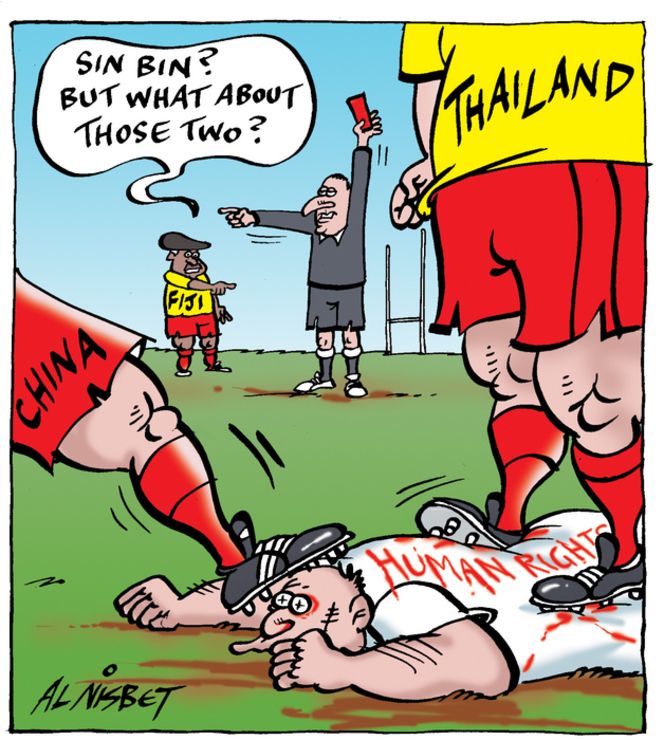
Abb.: "Sin Bin? But what about those two?" / von
Alistair Nisbet (1958 - ), 2009
"In the background of a view of a rugby game
in progress, Prime Minister John Key, as referee, has ordered Fiji off the field.
In the foreground, Thailand and China are stomping on 'Human Rights' who lies
covered in blood on the ground. Refers to what seems unfair treatment of
Commodore Bainimarama and Fiji by New Zealand by comparison with our continuing
good relations with both Thailand and China who are both guilty of human rights
enfringements."
[Bildquelle: "Sin bin? But what about those two?" 18
April 2009. Nisbet, Alistair, 1958- :[Digital cartoons dated from November 2000
onwards.]. Ref: DCDL-0010922. Alexander Turnbull Library, Wellington, New
Zealand. http://natlib.govt.nz/records/23101012.
-- "You can copy this item for personal use, share it, and post it on a blog or
website. It cannot be used commercially without permission,"]
2009-04-21


Der König wird zum Ehrenmitglied der Schweizer Vereinigung zur Förderung Waadtländer Weins "Confrérie du Guillon" ernannt.
Abb.: Lage des Kantons Waadt (Vaud)
[Bildquelle: CIA. -- Public domain]
2009-05-05
Premiere des Films Power Kids (5 หัวใจฮีโร่) von Krissanapong Rachata (กฤษณพงศ์ ราชธา)
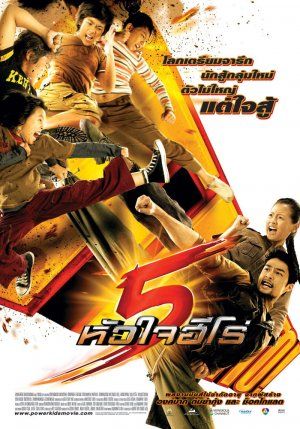
Abb.: Plakat
[Bildquelle: Wikipedia. -- Fair use]
|
"Power Kids (5 หัวใจฮีโร่) is a 2009 Thai action film directed by Krissanapong Rachata (กฤษณพงศ์ ราชธา). The film is about a group of children who team up to fight against a group of terrorists who have seized the hospital moments before their friend is about to go in for surgery. The film grossed $97,836 in Thailand and was shown at several film festivals across North America. ReleasePower Kids was released in Thailand on March 5, 2009.[1] On its opening week, Power Kids was the fourth highest grossing film earning $54,715.[1] The film earned a total of $97,836 on its theatrical run in Thailand and earned $259,677 worldwide.[1] [...]Cast
[Quelle: http://en.wikipedia.org/wiki/Power_Kids. -- Zugriff am 2013-03-28] |
2009-05-13
Erstes Auftreten des Schweinegrippevirus vom Subtyp A/H1N1 in Thailand. Pandemie H1N1 2009/10. In Thailand 16.900 Erkrankungen und 184 Tote.
Abb.: Auftreten von Schweinegrippe 2009
[Bildquelle: GoldenMew / Wikipedia. -- GNU FDLicense]
Abb.: Auftreten von Schweinegrippe 2009 in Thailand: rot: bestätigte Erkrankungen, schwarz: Tote
[Bildquelle: Khemkhaeng / Wikipedia. -- GNU FDLicense]
"The 2009 flu pandemic in Thailand, part of an epidemic in 2009 of a new strain of influenza A virus subtype H1N1 causing what has been commonly called swine flu, made its first confirmed appearance in Thailand on May 13, 2009, when Thailand confirmed two cases of swine flu. Both of the individuals confirmed as having swine flu had recently traveled to Mexico. The Thai Public Health Ministry announced on July 16 that it had ended daily updates on the type A(H1N1) influenza pandemic, saying it wanted to avoid public confusion and would give weekly updates.[1] There were 4,469 confirmed cases in Thailand and 44 confirmed deaths as of July 22, 2009." [Quelle: http://en.wikipedia.org/wiki/2009_flu_pandemic_in_Thailand. -- Zugriff am 2012-06-05]
2009-05-15
Wegen der Weltwirtschaftskrise ist der Tourismus nach Thailand sehr eingebrochen.
Abb.: Ankünfte ausländischer Touristen (in Millionen Passagiere) 2007 - 2011
Abb.: Touristen, Patong Beach, Phuket (ภูเก็ต), 2006
[Bildquelle: Neitram / Wikimedia. -- GNU FDLicense]
Abb.: Lage von Phuket (ภูเก็ต)
[Bildquelle: OpenStreetMap. -- Creative Commons Lizenz (Namensnennung, share alike)]
2009-05-15

Abhisit Vejjajiva’s Address at the Foreign Correspondents’ Club, Hong Kong (FCCHK), 15 May 2009 and Q&A Session
"Q: (Bloomberg) We are relieved to hear that His Majesty is in good health. In his recent interview with Der Spiegel, M.R. Sukhumbhand Baripatra said that he is now afraid for the first time that Thailand could slip into chaos when His Majesty is no longer around. Nobody lives forever. The King has been on the throne in 60 years, right back to when Truman was in the White House. The investors I have been talking to said they are worried about the succession as they are about the present impasse. You mentioned twin challenges. Isn’t the succession actually a greater challenge for Thailand? PM: If you look at succession issues, there are two things that we should accept. The first is that if there are clear rules for succession. That eliminates a lot of uncertainty around how the succession process will actually evolve or work out. There are clear constitutional provisions, so in that sense, that eliminates some of the uncertainty. The second issue is undebatable. When you have had a leader for more than six decades – and one that has built up so much reverence and respect from the people, there’s always going to be anxiety. I don’t know of any country or society or even organization – where there has been an inspirational leader who has been there for a long time – that does not have anxiety about succession. But Thailand has to make sure that we are mature enough as a country to deal with changes, economic, political and whatever issues that we need to face. I have no illusion that when it happens, it will be a very difficult time for all of us because we are very much attached to His Majesty. But we have to prove our maturity as a people and as a society and demonstrate to the rest of the world that we can deal with all issues and changes.
(Lese-majeste law)
Q: (Le Monde) Many critics have been quite vocal about the provisions under the lese-majeste and how they have been detrimental to the freedom of the press. In many occasions, some bloggers have been particularly famous for ending up on the wrong side of the lese-majeste but also in many others, including foreign correspondents in some instances.
PM: On lese-majeste law, let me reaffirm my belief. This law has been in place for a long time. It is not even a special law. It is part of our Criminal Code in the section on national security as a mechanism to protect one of our key institutions which is supposed to be above conflict and therefore has no other self-defence mechanism. We do not want members of the monarchy taking people to court and therefore be directly in conflict with people.
The problem with this law is more with its enforcement over the last few years, where the law has often been abused or too liberally interpreted. The cases that are now proceeding are mostly cases initiated before I assumed office. Since I assumed office, what I have done is that I have asked people involved particularly the police and now I have asked the Justice Ministry to come up with standard operating procedures so that people know exactly what the limits of this law are. Generally, expression of opinions, for instance, academic opinions concerning institutions is not something that would violate the law. But accusing or making allegations that are damaging to the institution or members of the institution would violate the law, just as you and I would be taken to court if you were to defame or cause damages to other people’s reputations. So what I hope to do is to get these new standard operating procedures in place. And I will confirm to you that in no case have people been prosecuted for their political views. If the things that they do to the monarchy were done to other people, they would also have been taken to court and punished, and probably they would suffer more because they probably would not be given a pardon."[Quelle: http://www.thaiembassy.sg/press_media/speeches/gist-of-pm-abhisit-vejjajiva%E2%80%99s-address-at-the-foreign-correspondents%E2%80%99-club-hong. -- Zugriff am 2014-10-24]
2009-05-19
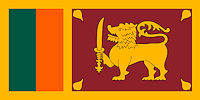
Militärischer Sieg über die LTTE (Liberation Tigers of Tamil Eelam - தமிழீழ விடுதலைப் புலிகள்) beendet den Bürgerkrieg zwischen Tamilen und Singhalesen in Sri Lanka.
Abb.: Sprachgruppen und Religionen in Sri Lanka 1974
[Bildquelle: CIA. -- Public domain]
2009-05-20
Premiere des Musicals Maenak Prakanong the Musical, (แม่นาคพระโขนง เดอะมิวสิคัล) von Takonkiet Viravan (ถกลเกียรติ วีรวรรณ, 1966 - ), starring Myria Benedetti (มีเรีย เบนเนเด็ตตี้, 1975 - ) and Anatpol Sirichumsang (อาณัตพล ศิริชุมแสง, 1983 - )
Das Album auf Spotify:
URI: spotify:album:32NamvajIAKZ8X7eBanl78
URL: https://open.spotify.com/album/32NamvajIAKZ8X7eBanl78
Abb.: Plakat
[Bildquelle: th.Wikipedia. -- Fair use]
2009-05-22
2009-05-27
Im Zoo von Chiang Mai (สวนสัตว์เชียงใหม่) gebiert die Riesenpandabärin Lin Hui (หลินฮุ่ย / 林惠, 2001 - ) ein Junges. Sie war künstlich befruchtet worden. Das Junge heißt Lin Bing (หลินปิง / 林冰).
Abb.: Lage des Zoos von Chiang Mai (สวนสัตว์เชียงใหม่)
[Bildquelle: OpenStreetMap. -- Creative Commons Lizenz (Namensnennung, share alike)]
Abb.: Lin Hui (หลินฮุ่ย / 林惠) mit ihrem 2tägigen Baby Lin Bing (หลินปิง / 林冰), 2009-05-29
[Bildquelle: Shihmei Barger 舒詩玫. -- http://www.flickr.com/photos/beautifulcataya/3575997001/. -- Zugriff am 2012-01-13. -- Creative Commons Lizenz (Namensnennung, keine kommerzielle Nutzung, keine Bearbeitung)]
2009-05-28

Die Bundesregierung widerruft das Visum für die Bundesrepublik, das im Dezember 2008 Ex-Ministerpräsident Thaksin Shinawatra (ทักษิณ ชินวัตร, 1949 - ) erteilt worden war.
2009-05-31
Nach 41 Jahren gibt Kurt Wachtveitl (1937 - ) die Leitung des Hotel Oriental in Bangkok ab. Der in Wangen im Allgäu geborene Wachtveitl hatte die Geschäftsführung 1967 übernommen. Wachtveitl hatte auf der Hotelfachschule in Lausanne eine Thailänderin kennengelernt, der er nach Thailand folgte und die seine Ehefrau wurde. Zuerst hatte er ein kleines Hotel in Pattaya (พัทยา), danach übernahm er das Oriental. Wachtveitl galt lange als weltweit dienstältester Hotelmanager im selben Haus.
Abb.: Lage des Oriental Hotel
[Bildquelle: OpenStreetMap. -- Creative Commons Lizenz (Namensnennung, share alike)]
Abb.: Mandarin Oriental Hotel, 2009
[Bildquelle: Mandarin Oriental Hotel Group / Wikipedia. -- Creative Commons Lizenz (Namensnennung, share alike)]
2009-06
IMD World Competitiveness Yearbook (WCY) 2009 gibt Thailand den 26. Rang unter 57 Ländern.
2009-06-01 - 2009-06-07
2009 Asian Women’s Club Volleyball Championship in Nakhon Pathom (นครปฐม). Sieger ist der Thai-Club Federbrau (benannt nach Federbräu Bier). Most Valuable Player (MVP): Onuma Sittirak (อรอุมา สิทธิรักษ์, 1986 - )
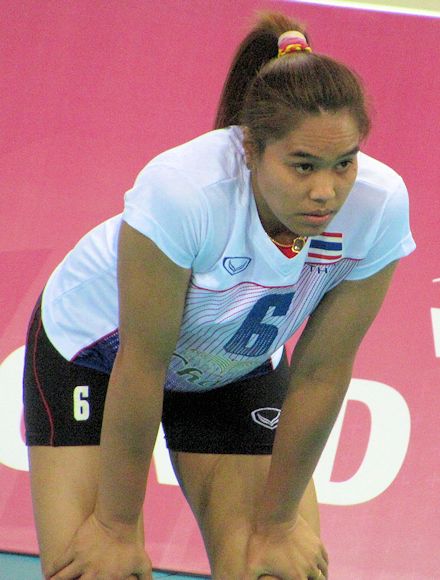
Abb.: MVP
Onuma Sittirak (อรอุมา สิทธิรักษ์,
1986 - ), 2011
[Bildquelle: Yakov Fedorov / Wikipedia. --
Creative Commons
Lizenz (Namensnennung, share alike)]
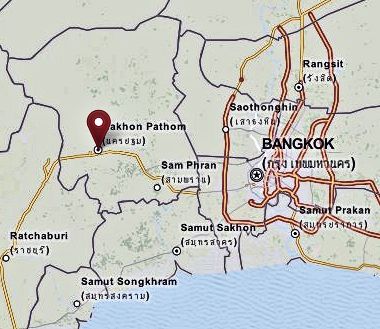
Abb.: Lage
von Nakhon Pathom (นครปฐม)
[Bildquelle: OpenStreetMap. --
Creative
Commons Lizenz (Namensnennung, share alike)]
2009-06-02
Die People's Alliance for Democracy (PAD, พันธมิตรประชาชนเพื่อประชาธิปไตย)) gründet die New Politics Party (พรรคการเมืองใหม่ ก.ม.ม.).
Abb.: ®Logo
[Bildquelle: th.Wikipedia]
"The New Politics Party or NPP (Thai: พรรคการเมืองใหม่ ก.ม.ม. or Karn Muang Mai, KMM) is a political party in Thailand which was founded on June 2, 2009. It is the political party of the People's Alliance for Democracy (PAD, พันธมิตรประชาชนเพื่อประชาธิปไตย), with which it shares the same principles and ideas. It claims that other political parties in Thailand only protect their own vested interests, such as the bureaucrats and nobles, and are unable to tackle the country's problems. The party is expected to solicit more than 5,000 members and set up branches in all the four regions of Thailand, within the one-year deadline. It also plans to an early completion of the registration process in order to contest the next general election. The party's colors are yellow and green. Yellow refers to the constitutional monarchy of Thailand, and green represents "clean politics", in which corruption is repressed by an independent judiciary.
Aims for Political ReformPAD and NPP want to replace the National Assembly (รัฐสภาไทย) of Thailand by a body with only 30 per cent directly elected Members of Parliament, the rest installed by employers' and labour unions or similar pressure groups, in order to achieve their ideal of “clean politics”. Their adherents typically distrust established politicians and representatives and want to replace them. The party claims to defend the supposedly endangered monarchy.
HistoryIn May 2009, The People's Alliance for Democracy made an announcement that they were creating a political party. The party was formally registered on June 2, 2009. The interim leader of the party was Somsak Kosaisuuk (สมศักดิ์ โกศัยสุข). On October 7, 2009, Sondhi Limthongkul (สนธิ ลิ้มทองกุล / 林明達, 1947 - ) was elected as the leader of the party.
Key personsSondhi Limthongkul, one of the five PAD core leaders and media mogul, is the party's inaugural leader and PAD coordinator. Suriyasai Katasila (สุริยะใส กตะศิลา) is the secretary-general. This was decided upon by the 21 co-founders during a meeting that lasted two hours.
2011 ruptureIn 2011 it came to a break between Sondhi and the majority of PAD on the one and the NPP leadership around Somsak on the other side. In late March Sondhi demanded the party to boycot the upcoming parliamentary elections according to PAD's extra-parliamentary opposition strategy and its abstention campaign. This was declined by Somsak and his NPP functionaries who are keen on fielding candidates and seeking parliamentary representation. The hardline PAD position however is, that all party politicians - even the ones of NPP - should retreat for a certain period and the King is to appoint a non-partisan expert government. This idea again, was rejected by Somsak and his public servants' union SELRC as undemocratic and “close to a coup d'etat”. This lead consequently to the retirement of Somsak from the PAD leadership in late April and Sondhis leave from the NPP in return. Correctly concluded, the NPP cannot be considered as PAD's political wing any longer.
CriticismCritics inside and outside Thailand, including the Asian Human Rights Commission (AHRC), label the PAD and its political party as neo-fascist, stating "Some commentators and opponents of the alliance have described its agenda as fascist. This is not an exaggeration. Experience shows that the types of systemic changes and regimes that follow such movements, although they may not describe themselves as fascist, have fascist qualities. Indeed, successive dictatorships in Thailand's modern history appreciated, expressed and used many fascist symbols and policies, and the residue of these can be found in the language and behaviour of the alliance leaders today.""
[Quelle: http://en.wikipedia.org/wiki/New_Politics_Party. -- Zugriff am 2012-01-13]
2009-06-08
In Narathiwat (นราธิวาส) erschießen Maskierte 11 Personen und verletzen 20 während des Gebets in einer Moschee.
Abb.: Lage von Narathiwat (นราธิวาส)
[Bildquelle: OpenStreetMap. -- Creative Commons Lizenz (Namensnennung, share alike)]
2009-06-11 - 2009-06-15
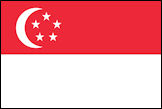
Singapur: Creatively Thai 2009 – High Street Fashion & Young Designers Showcase
Abb.: Lage von Singapur
[Bildquelle: OpenStreetMap. -- Creative Commons Lizenz (Namensnennung, share alike)]
Abb.: Creatively Thai 2009 – High Street Fashion & Young Designers Showcase
[Bildquelle: AndyLeo@Photography. -- http://www.flickr.com/photos/14-24mm/3625475628/in/photostream. -- Zugriff am 2012-10-23. -- Creative Commons Lizenz (Namensnennung, keine kommerzielle Nutzung, keine Bearbeitung)]
Abb.: Creatively Thai 2009 – High Street Fashion & Young Designers Showcase
[Bildquelle: AndyLeo@Photography. -- http://www.flickr.com/photos/14-24mm/3622542338/in/photostream. -- Zugriff am 2012-10-23. -- Creative Commons Lizenz (Namensnennung, keine kommerzielle Nutzung, keine Bearbeitung)]
2009-06-13
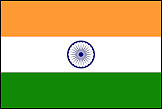
Parlamentswahlen in Indien. Die Kongresspartei gewinnt. Manmohan Singh (ਮਨਮੋਹਨ ਸਿੰਘ, 1962 - ) bleibt Ministerpräsident.
Abb.: Indien
[Bildquelle: CIA. -- Public domain]
Abb.: Manmohan Singh (ਮਨਮੋਹਨ ਸਿੰਘ)
[Bildquelle: DonkeyHotey. -- http://www.flickr.com/photos/donkeyhotey/5666078544/in/photostream. -- Zugriff am 2012-01-05. -- Creative Commons Lizenz (Namensnennung, share alike)]
2009-06-08


Nach Angaben des SIPRI rückt China bei den Rüstungsausgaben erstmals auf Platz zwei nach den USA auf.
Abb.: China
[Bildquelle: CIA. -- Public domain]
Abb.: Militärausgaben in Milliarden US$ (zu festen Preisen 2009) der USA und der VR China
[Datenquelle: SIPRI]
2009-06-17

Tod von Hans Penth (1937 - 2009)
"Hans Penth (* 6. Mai 1937 in Berlin; † 17. Juni 2009 in Chiang Mai (เชียงใหม่), Thailand) war ein deutscher Sprachwissenschaftler und Thaiist. Hans Penth promovierte 1964 an der Universität Frankfurt in "Sprachen und Geschichte Südostasiens" mit den Nebenfächern Chinesisch und Ethnologie. Beschäftigte er sich in seiner Dissertation mit der Geschichte von Aceh (Sumatra), so ging er Ende der Sechziger Jahre nach Thailand.
Zwischen 1965 und 1970 studierte Penth am Wat Phan Tao (วัดพันเตา) in Chiang Mai die Chroniken des alten Reiches Lan Na (อาณาจักรล้านนา) in Nord-Thailand. Er ließ sich in Chiang Mai nieder und spezialisierte sich im Folgenden auf die Geschichte Nord-Thailands. In den Siebziger Jahren war er als Forscher am Institut für Sozialwissenschaften der Universität Chiang Mai (มหาวิทยาลัยเชียงใหม่) tätig. Von 1981 bis 1997 war er "ausländischer Experte" am Archiv für Inschriften Lannas des Instituts für Sozialforschung, das seinerzeit neu gegründet worden war. Hans Penth verfasste mehr als 100 wissenschaftliche Artikel, darunter der bekannte Jinakalamali-Index. In seinen Publikationen und Vorlesungen verband er die Geschichte und Kultur Lannas mit dem seinerzeitigen Alltagsleben.
Hans Penth trat 1997 in den Ruhestand, blieb aber weiterhin wissenschaftlich tätig, u. a. als Ehrenmitglied der Siam Society und als enger Mitarbeiter von Prinzessin Galyani Vadhana (สมเด็จพระเจ้าพี่นางเธอ เจ้าฟ้ากัลยาณิวัฒนา กรมหลวงนราธิวาสราชนครินทร์, 1923 - 2008), der Schwester von König Bhumibol Adulyadej (Rama IX.). Seine Hauptarbeit lag nun in der Publikation von Inschriften, die bis dato nur als Mikroverfilmung vorlagen.
Hans Penth starb nach langer Krankheit am 17. Juni 2009 im Suan-Dok-Krankenhaus (โรงพยาบาลมหาราชนครเชียงใหม่ aka. สวนดอก) in Chiang Mai und wurde am 21. Juni nach buddhistischem Bestattungsritus eingeäschert. Er war verheiratet mit einer thailändischen Professorin für Romanistik und hatte einen Sohn."
[Quelle: https://de.wikipedia.org/wiki/Hans_Penth. -- Zugriff am 2015-12-30]
2009-06-24
Der Massentest in Thailand eines HIV-Impstoffs in der Studie RV 144 gibt zu vorsichtiger Hoffnung Anlass.
"Die einzige bedeutende Ausnahme hiervon ist ein Impfstoff, welcher im Rahmen der klinischen Studie RV 144 erforscht wurde: An dieser Studie, die zwischen Oktober 2003 und Juli 2009 in Thailand durchgeführt wurde, nahmen 16.402 Thailänder im Alter zwischen 18 und 30 Jahren teil. Der Wirkstoff wird von Sanofi-Pasteur hergestellt. Die Studie wurde von der US-Army finanziert und vom Gesundheitsministerium Thailands durchgeführt. Die Probanden wurden zufällig verteilt und verblindet mit dem Impfstoff oder Placebo geimpft. Alle Probanden wurden gezielt aufgeklärt, wie sie sich vor einer HIV-Infektion schützen können - wie beispielsweise durch Safer Sex - und es danach dem Zufall überlassen, wer sich in den folgenden Jahren dennoch infizieren wird. Daraufhin wurden bei den Studienteilnehmern drei Jahre lang regelmäßig HIV-Tests durchgeführt. Das Ergebnis dieser Studie ist, dass in der Gruppe der mit dem Wirkstoff Geimpften die Infektionsrate mit HIV um 31,2% geringer war, als in der mit einem Placebo geimpften Kontrollgruppe. In absoluten Zahlen entspricht das 74 HIV-Infizierten aus der Placebo-Gruppe und 51 in der Impf-Gruppe. Bei der Interpretation dieser Zahl ist jedoch Vorsicht geboten vor einer überhöhten Erwartungshaltung. Denn aufgrund der hohen Gefahr, die von HIV für die Probanden ausgeht, ist es ethisch nicht vertretbar gewesen, die Probanden nach der Impfung gezielt mit HIV zu infizieren, nur um eine eventuelle Wirksamkeit des Impfstoffes zu erforschen.
Die Tatsache, dass diese Zahlen im Vergleich zur Grundgesamtheit von 16.402 Teilnehmern in beiden Gruppen sehr klein sind und dass das besagte Zufalls-Element bezogen auf die Infektion mit HIV vorhanden war, verhindert, dass der sich daraus ergebende Prozentsatz von 31,2% aussagekräftig ist. Dennoch lässt sich anhand von statistischen Verfahren eine statistische Signifikanz des Effektes feststellen, d.h. als Ergebnis der Studie lässt sich die folgende Aussage bejahen: "Die Infektionsrate in der Gruppe der Geimpften war geringer, als in der Kontrollgruppe, und dies unterlag nicht dem statistischen Zufall."
Angesichts der Tatsache, dass dies das erste Mal in der Geschichte der Forschung nach einem HIV-Impfstoff ist, dass einem Impfstoff eine signifikante Wirkung nachgewiesen werden konnte, sprechen manche Forscher von einem Durchbruch, denn die Ergebnisse hätten eine Signalwirkung der "Wiederaufbruchstimmung" in der AIDS-Forschung ausgelöst und würde viele neue und wichtige Fragen für die Forschung aufbringen. Dennoch ist das Ergebnis nicht als Lösung für den Kampf gegen HIV misszuverstehen und auch nach diesen Ergebnissen muss weiterhin angenommen werden, dass es aufgrund der sehr hohen Wandlungsfähigkeit des HI-Virus einen hundertprozentigen Schutz gegen HIV nie geben wird. Im Kampf gegen die Ausbreitung der unheilbare Immunschwächekrankheit bleibt "Safer Sex" weiterhin das einzig wirksame Mittel."
[Quelle: http://de.wikipedia.org/wiki/HIV-Impfstoff. -- Zugriff am 2012-01-10]
2009-06-29


Body Fashion (Thailand) Co., eine Tochter des deutsch-schweizerischen Triumph-Konzerns, entlässt 1959 Arbeiterinnen (ca. 50% der Belegschaft) im Werk Bang Phli (บางพลี). Die Produktion wird in ein Werk in Nakhon Sawan (นครสวรรค์) verlagert. Die Firma gibt als Grund die niedrigeren Löhne in Nakhon Sawan an. Nach Gewerkschaftsangaben sind die meisten der in Bang Phli Entlassenen Gewerkschaftsmitglieder.
Abb.: Lage von Bang Phli (บางพลี) und Nakhon Sawan (นครสวรรค์)
[Bildquelle: OpenStreetMap. -- Creative Commons Lizenz (Namensnennung, share alike)]
ausführlich: http://www.payer.de/thailandchronik/ressourcen.htm
Zu Chronik 2009 / B. E. 2552. -- 3. Juli bis Dezember